Core courses offered by Wray Castle Ltd are the foundation of our specialized telecommunications and technology training programs. These courses are designed to provide learners with essential knowledge and skills in key areas such as 5G, LTE, IP, radio engineering, network virtualization, and critical communications like TETRA and PMR.
Our core courses serve as the building blocks for a successful career in the telecommunications industry, covering fundamental concepts, principles, and best practices. Whether you are a beginner looking to enter the field or an experienced professional seeking to enhance your expertise, our core courses are tailored to meet your specific learning needs.
At Wray Castle, we understand the importance of staying up-to-date with the latest advancements in technology. That's why our core courses are regularly updated to reflect the most current industry trends and developments. Our team of expert instructors bring real-world experience and knowledge to the classroom, ensuring that you receive the most relevant and practical training possible.
By enrolling in our core courses, you will gain a solid understanding of the fundamental principles of telecommunications and technology. You will learn how to design, implement, and manage advanced telecommunications networks, as well as troubleshoot and optimize existing systems. Our hands-on approach to learning allows you to apply your knowledge in real-world scenarios, preparing you for success in a competitive industry.
Whether you are looking to launch a new career in telecommunications or advance your existing skills, our core courses provide the foundation you need to succeed. Join the thousands of learners who have benefited from our high-quality training programs and take the first step towards a rewarding career in telecommunications and technology.
Core Courses
-
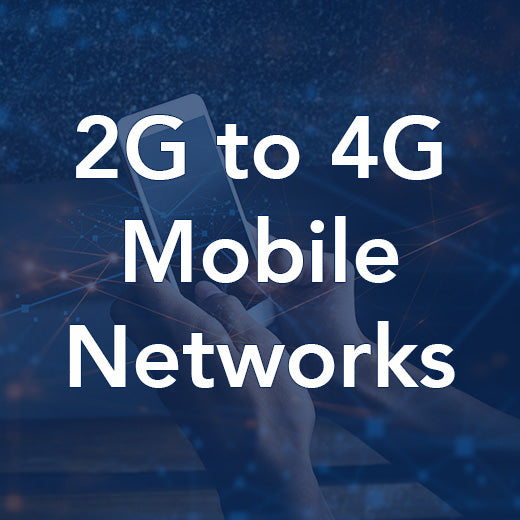
2G to 4G Mobile Networks
Course Code: MB1404 Course Overview This 2G to 4G Mobile Networks training course offered by Wray Castle provides a comprehensive technical overview of key cellular technologies, including 2G GSM, GPRS, 3G UMTS, and 4G LTE, all in one convenient package. Designed for technical professionals who need a solid understanding of these technologies without the need to delve into each one separately, this course is ideal for engineers, technical sales representatives, technical managers, and other staff members looking to gain a broad understanding of modern mobile technologies.Participants in this course do not need any specific prerequisites other than the ability to grasp technical information, making it accessible to a wide range of individuals interested in expanding their knowledge of mobile networks. The curriculum covers essential topics such as PSTN overview, SS7 signaling basics, call control signaling, GSM CS domain interfaces and protocols, UMTS architecture, LTE, and more. By the end of the training, attendees will have a solid foundation in 2G to 4G mobile networks, enabling them to better navigate the complexities of modern cellular technologies in their professional roles. Who Would Benefit This course is suitable for engineering, technical sales, technical management and other staff who require a general technical overview of modern mobile technologies but who do not need to invest the time necessary to learn about each technology in depth. Prerequisites This is a technical foundation course. Candidates do not need any specific prerequisites other than the ability to grasp technical information. Course Contents PSTN Overview SS7 Signalling Basics Call Control Signalling, ISUP and SCCP 2G Circuit Switched Domain GSM CS Domain Interfaces and Protocols CAMEL GPRS UMTS Architecture Overview UMTS Air Interface UMTS Circuit Switched Core – Protocols and Procedures UMTS Packet Switched Core – Protocols and Procedures LTE
POA: Private Course
-
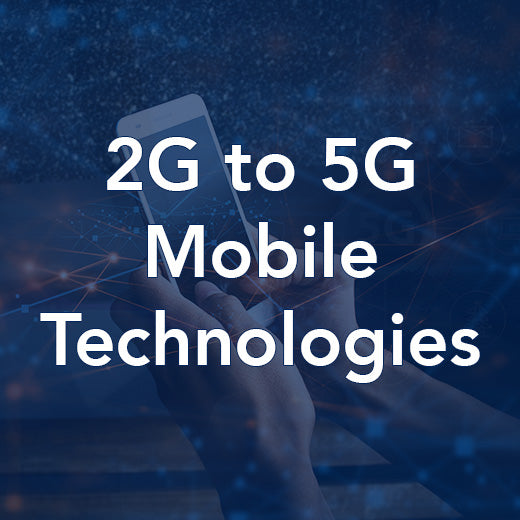
2G to 5G Mobile Technologies
Our 2G to 5G Mobile Technologies Training Course is designed to provide professionals in the telecommunications industry with the knowledge and skills needed to understand and work with the latest mobile technologies. With the rapid evolution of mobile networks, staying up-to-date with the latest advancements is crucial for professionals looking to advance their careers in this field. Our comprehensive course covers everything from the basics of 2G technology to the cutting-edge developments in 5G networks.By enrolling in our training course, participants will gain a deep understanding of the principles and technologies behind 2G, 3G, 4G, and 5G networks. They will learn about the key features and capabilities of each generation, as well as the challenges and opportunities presented by the transition to 5G. Our expert instructors will guide participants through hands-on exercises and real-world case studies to ensure they have the practical skills needed to succeed in this dynamic industry.Whether you are a seasoned professional looking to upgrade your skills or a newcomer to the telecommunications field, our 2G to 5G Mobile Technologies Training Course will provide you with the knowledge and expertise needed to excel in this fast-paced industry. Stay ahead of the curve and advance your career with our industry-leading training program. Prerequisites A basic understanding of telecoms principles would be beneficial. Topic Areas Include: An overview of basic radio and cellular techniques and technologies Network Generations from 2G to 5G 3GPP Release programme An overview of 2G (GSM) network architecture and functionality GSM TDMA air interface operating principles GPRS and EDGE upgrades to GSM GSM services TETRA networks An overview of 3G (UMTS) network architecture and functionality UMTS WCDMA air interface operating principles HSPA and HSPA+ upgrades to UMTS An overview of 4G (LTE) network architecture and functionality LTE OFDMA air interface operating principles Evolved Packet Core (EPC) operation Small cells and heterogeneous networks Self Organising Networks (SON) LTE voice options LTE Advanced and LTE Advanced Pro Wi-Fi/Cellular interworking LTE operation in unlicensed frequency bands Machine Type Communications (MTC) LTE for public safety Introduction to 5G 3GPP use cases for 5G Performance targets for 5G Radio Spectrum for 5G 5G OFDMA air interface 5G System Architecture Non Standalone (NSA) and Standalone (SA) New Radio (NR) 5G Core Network Functions Trainer: Les Granfield Les is a technical trainer with 35 years of experience. His expertise extends across a wide range of telecommunications technologies. He specializes in GSM, GSM-R, ERTMS/ETCS, UMTS and LTE radio access networks, radio planning, radio access network optimization and Push to Talk over Cellular (PoC).
£1,815.00
-
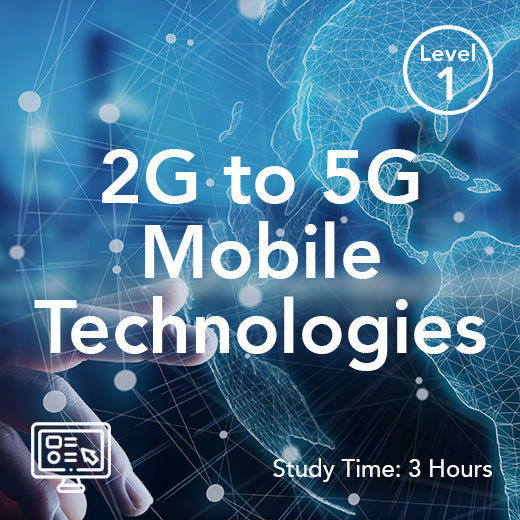
2G to 5G Mobile Technologies (On-Demand)
Our 2G to 5G Mobile Technologies Training Course is designed to provide professionals in the telecommunications industry with the knowledge and skills needed to understand and work with the latest mobile technologies. With the rapid evolution of mobile networks, staying up-to-date with the latest advancements is crucial for professionals looking to advance their careers in this field. Our comprehensive course covers everything from the basics of 2G technology to the cutting-edge developments in 5G networks.By enrolling in our training course, participants will gain a deep understanding of the principles and technologies behind 2G, 3G, 4G, and 5G networks. They will learn about the key features and capabilities of each generation, as well as the challenges and opportunities presented by the transition to 5G. Our expert instructors will guide participants through hands-on exercises and real-world case studies to ensure they have the practical skills needed to succeed in this dynamic industry.Whether you are a seasoned professional looking to upgrade your skills or a newcomer to the telecommunications field, our 2G to 5G Mobile Technologies Training Course will provide you with the knowledge and expertise needed to excel in this fast-paced industry. Stay ahead of the curve and advance your career with our industry-leading training program. This self-paced on-demand distance learning course features illustrated course books, videos, tests and full tutor support. Who would benefit This course is suitable for engineering, technical sales, technical management and other staff who require a general technical overview of mobile technologies but who do not need to invest the time necessary to learn about each technology in depth. Prerequisites A basic understanding of telecoms principles would be beneficial. Topic Areas Include: An overview of basic radio and cellular techniques and technologies Network Generations from 2G to 5G 3GPP Release programme An overview of 2G (GSM) network architecture and functionality GSM TDMA air interface operating principles GPRS and EDGE upgrades to GSM GSM services TETRA networks An overview of 3G (UMTS) network architecture and functionality UMTS WCDMA air interface operating principles HSPA and HSPA+ upgrades to UMTS An overview of 4G (LTE) network architecture and functionality LTE OFDMA air interface operating principles Evolved Packet Core (EPC) operation Small cells and heterogeneous networks Self Organising Networks (SON) LTE voice options LTE Advanced and LTE Advanced Pro Wi-Fi/Cellular interworking LTE operation in unlicensed frequency bands Machine Type Communications (MTC) LTE for public safety Introduction to 5G 3GPP use cases for 5G Performance targets for 5G Radio Spectrum for 5G 5G OFDMA air interface 5G System Architecture Non Standalone (NSA) and Standalone (SA) New Radio (NR) 5G Core Network Functions
£750.00
-
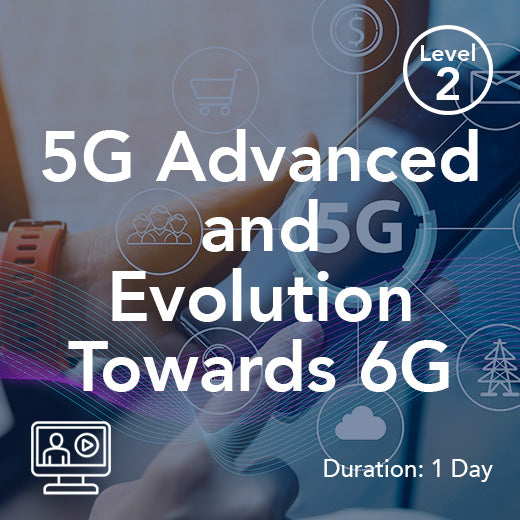
5G Advanced and Evolution Towards 6G
This 5G Advanced and Evolution Towards 6G course delves into 5G Advanced and its role as a stepping stone to the groundbreaking 6G era. You'll explore how 5G is being enhanced to deliver even higher speeds, lower latency, and greater capacity. We'll dissect key features and advancements that are laying the groundwork for the future of connectivity. Beyond 5G, the course will provide a glimpse into the potential of 6G, examining emerging technologies and their implications for industries and society. The course provides a holistic overview of the current (relatively early) state of play of 6G development. We develop crucial insights into 6G design, performance objectives, and its intersection with the metaverse and AI, ensuring participants are well-prepared for the future of wireless communication. By the end of this course, you'll gain a comprehensive understanding of the latestdevelopments in mobile network technology and the exciting possibilities they hold. Who Would Benefit Although this course is open to all, it is recommended that you have prior experience in telecommunications. Course Contents 5G Advanced - Base Capabilities Improvements Specific 5G Advanced Features 6G – a Look Ahead
£980.00
-
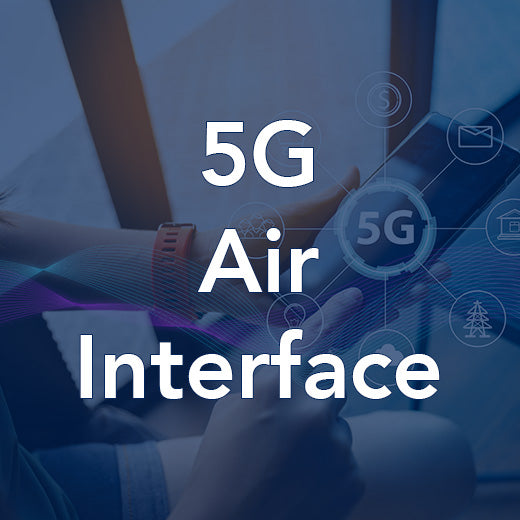
5G Air Interface Overview
Course Summary This 5G Air Interface Overview training course provides a technical introduction to the 5G New Radio. Participants will gain insight into the design goals, development schedule, principles, design, and implementation of the 5G air interface. Engineers who are new to or already working in mobile radio communications will benefit from this course, which assumes familiarity with telecommunications and general engineering terminology. Some understanding of LTE cellular systems would also be beneficial for attendees. During this course participants will delve into various topic areas related to 5G, including key features and standardization, use cases, performance objectives, deployment options, radio spectrum, millimeter-wave communications, principles of radio transmission and reception, multiple antennas, air interface protocol stack, architecture of the air interface physical layer, and procedures for data transmission and reception on the 5G air interface. For those looking for a self-paced option, this course is also available as a Self-Study Online Learning Programme. Who would benefit This course is intended for engineers either new to, or already working in, mobile radio communications. Prerequisites Familiarity with telecommunications and general engineering terminology is assumed. Some understanding of LTE cellular systems would be beneficial. Topic Areas Include: 5G introduction, key features and standardisation Use cases and performance objectives Non-standalone and standalone deployment options Radio spectrum and millimetre wave communications Principles of radio transmission and reception in 5G Multiple antennas in 5G Air interface protocol stack Architecture of the air interface physical layer Procedures for data transmission and reception on the 5G air interface Also available as a Self-Study Online Learning Programme, learn more.
POA: Private Course
-
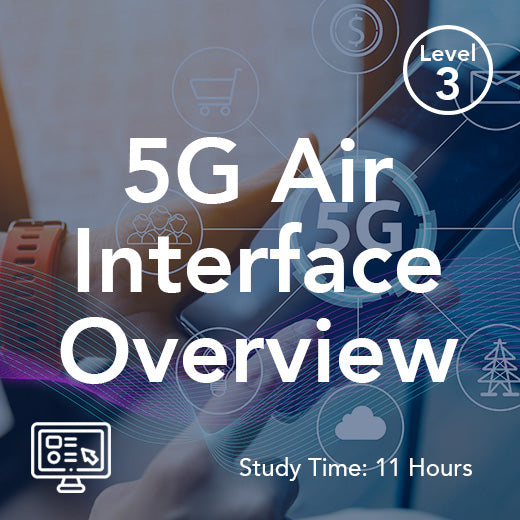
5G Air Interface Overview (On-Demand)
This 5G Air Interface Overview training course provides a technical introduction to the 5G New Radio. Participants will gain insight into the design goals, development schedule, principles, design, and implementation of the 5G air interface. Engineers who are new to or already working in mobile radio communications will benefit from this course, which assumes familiarity with telecommunications and general engineering terminology. Some understanding of LTE cellular systems would also be beneficial for attendees. During this course participants will delve into various topic areas related to 5G, including key features and standardization, use cases, performance objectives, deployment options, radio spectrum, millimeter-wave communications, principles of radio transmission and reception, multiple antennas, air interface protocol stack, architecture of the air interface physical layer, and procedures for data transmission and reception on the 5G air interface. This self-paced on-demand distance learning course features illustrated course books, videos, tests and full tutor support. Who would benefit This course is intended for engineers either new to, or already working in, mobile radio communications. Prerequisites Familiarity with telecommunications and general engineering terminology is assumed. Some understanding of LTE cellular systems would be beneficial. Topic Areas Include: 5G introduction, key features and standardisation Use cases and performance objectives Non-standalone and standalone deployment options Radio spectrum and millimetre wave communications Principles of radio transmission and reception in 5G Multiple antennas in 5G Air interface protocol stack Architecture of the air interface physical layer Procedures for data transmission and reception on the 5G air interface.
£500.00
-
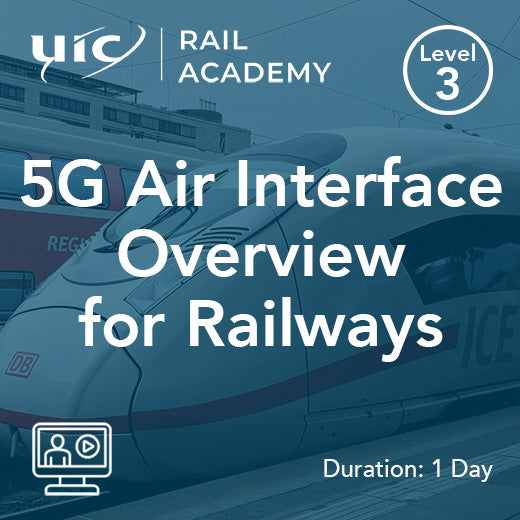
5G Air Interface Overview for Railways
This 5G Air Interface Overview for Railways course is a technical introduction to the 5G New Radio. The course includes the design goals and development schedule for 5G, and the principles, design and implementation of the 5G air interface. With the emergence of FRMCS our 5G Rail portfolio addresses the technical requirements of FRMCS. Who would benefit This course is intended for engineers either new to, or already working in, mobile radio communications. Prerequisites Familiarity with telecommunications and general engineering terminology is assumed. Some understanding of LTE cellular systems would be beneficial. Topic Areas Include: 5G introduction, key features and standardisation Use cases and performance objectives Non-standalone and standalone deployment options Radio spectrum and millimetre wave communications Principles of radio transmission and reception in 5G Multiple antennas in 5G Air interface protocol stack Architecture of the air interface physical layer Procedures for data transmission and reception on the 5G air interface
POA: Private Course
-
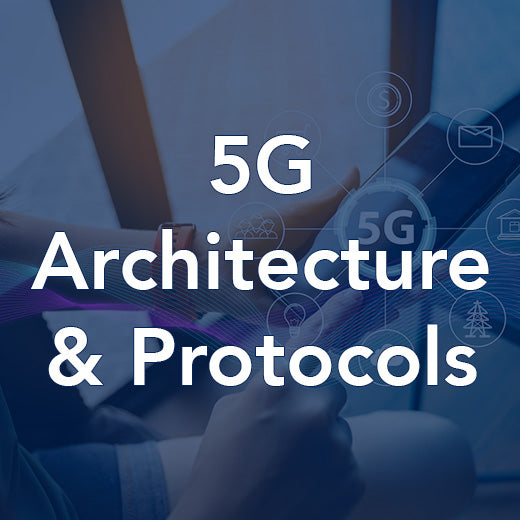
5G Architecture and Protocols Overview
Course Summary This 5G Architecture and Protocols Overview training course provides a comprehensive technical introduction to the 5G network, covering design goals, development schedules, and the core and radio access networks of 5G. Engineers new to or already working in mobile communication networks will benefit from this course, which assumes familiarity with telecommunications and general engineering terminology, with some understanding of LTE cellular systems being beneficial. The course covers a range of topic areas, including 5G introduction, key features, and standardization, use cases and performance objectives, radio access network architecture and protocols, core network architecture and protocols, network function virtualization, network slicing, interworking and compatibility between 5G, LTE, and Wi-Fi, PDU connectivity, Quality of Service, service provision, and signaling procedures in the 5G network. Who would benefit This course is intended for engineers either new to, or already working in, mobile communication networks. Prerequisites Familiarity with telecommunications and general engineering terminology is assumed. Some understanding of LTE cellular systems would be beneficial. Topic Areas Include: 5G introduction, key features and standardisation Use cases and performance objectives Radio access network architecture and protocols Non standalone and standalone deployment options Core network architecture and protocols Network function virtualisation and network slicing Interworking and compatibility between 5G, LTE and Wi-Fi PDU connectivity, Quality of Service and service provision Signalling procedures in the 5G network Also available as a Self-Study Online Learning Programme, learn more.
POA: Private Course
-
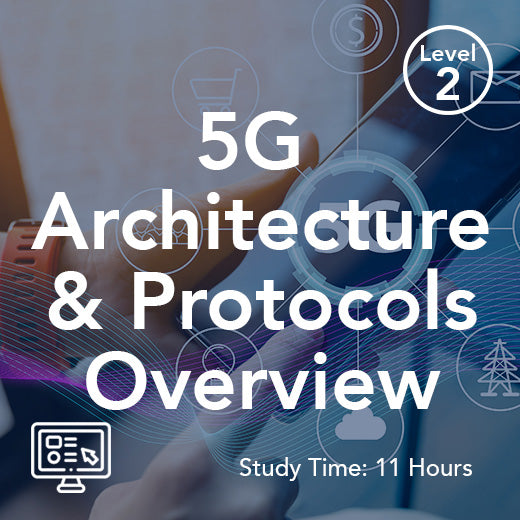
5G Architecture and Protocols Overview (On-Demand)
This 5G Architecture and Protocols Overview on-demand training course provides a comprehensive technical introduction to the 5G network, covering design goals, development schedules, and the core and radio access networks of 5G. Engineers new to or already working in mobile communication networks will benefit from this course, which assumes familiarity with telecommunications and general engineering terminology, with some understanding of LTE cellular systems being beneficial. The course covers a range of topic areas, including 5G introduction, key features, and standardization, use cases and performance objectives, radio access network architecture and protocols, core network architecture and protocols, network function virtualization, network slicing, interworking and compatibility between 5G, LTE, and Wi-Fi, PDU connectivity, Quality of Service, service provision, and signaling procedures in the 5G network. This self-paced on-demand distance learning course features illustrated course books, videos, tests and full tutor support. Who would benefit This course is intended for engineers either new to, or already working in, mobile communication networks. Prerequisites Familiarity with telecommunications and general engineering terminology is assumed. Some understanding of LTE cellular systems would be beneficial. Topic Areas Include: 5G introduction, key features and standardisation Use cases and performance objectives Radio access network architecture and protocols Non standalone and standalone deployment options Core network architecture and protocols Network function virtualisation and network slicing Interworking and compatibility between 5G, LTE and Wi-Fi PDU connectivity, Quality of Service and service provision Signalling procedures in the 5G network
£500.00
-
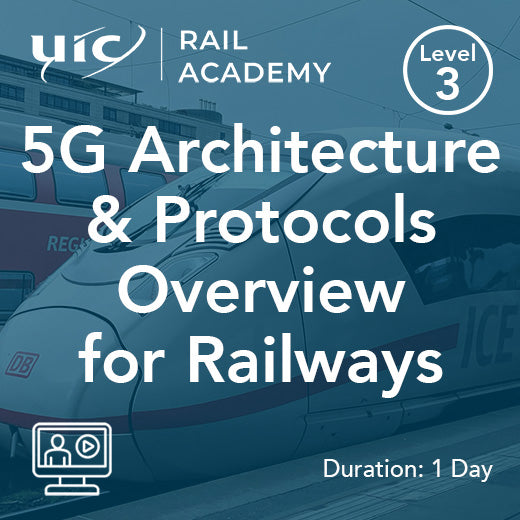
5G Architecture and Protocols Overview for Railways
This 5G Architecture and Protocols Overview for Railways course is a technical introduction to the 5G network. The course includes the design goals and development schedule for 5G, the principles, design and implementation of the core and radio access networks of 5G. With the emergence of FRMCS our 5G Rail portfolio addresses the technical requirements of FRMCS. Who would benefit This course is intended for engineers either new to, or already working in, mobile communication networks. Prerequisites Familiarity with telecommunications and general engineering terminology is assumed. Some understanding of LTE cellular systems would be beneficial. Topic Areas Include: 5G introduction, key features and standardisation Use cases and performance objectives Radio access network architecture and protocols Non standalone and standalone deployment options Core network architecture and protocols Network function virtualisation and network slicing Interworking and compatibility between 5G, LTE and Wi-Fi PDU connectivity, Quality of Service and service provision Signalling procedures in the 5G network
POA: Private Course
-
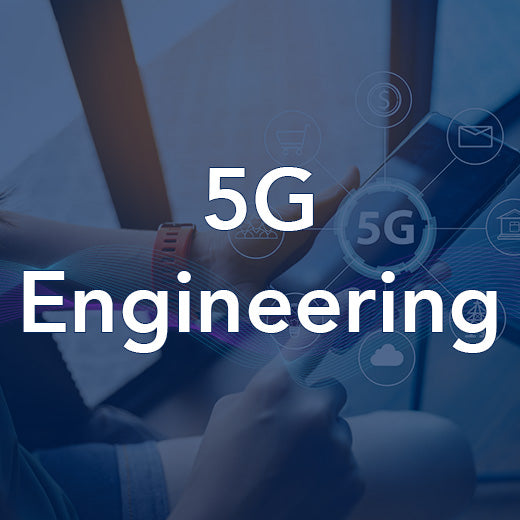
5G Engineering Overview
This 5G Engineering Overview course is a technical overview of 5G. The course includes the design goals and development schedule for 5G, and the principles and architecture of the 5G air interface, radio access network and core network. This 5G Engineering Overview training course provides a comprehensive technical overview of 5G, including its design goals, development schedule, and the principles and architecture of the 5G air interface, radio access network, and core network. Engineers new to or already working in mobile communications will benefit from this course, gaining valuable insights into the latest advancements in 5G technology. Participants in this course are assumed to have familiarity with general engineering and telecommunications terminology, with some understanding of LTE cellular systems being beneficial. The course covers a range of topic areas, including 5G introduction and key features, standardization and timelines for 3GPP and the ITU, use cases and performance objectives, radio spectrum and millimeter wave communications, principles of radio transmission and reception in 5G, radio access network architecture, non-standalone and standalone deployment options, core network architecture, network function virtualization and network slicing, and interworking and compatibility between 5G, LTE, and Wi-Fi. Overall, this 5G Engineering Overview training course offers a valuable opportunity for engineers to deepen their understanding of 5G technology and its implications for mobile communications. Who would benefit This course is intended for engineers either new to, or already working in, mobile communications. Prerequisites Familiarity with telecommunications and general engineering terminology is assumed. Some understanding of LTE cellular systems would be beneficial. Topic Areas Include 5G introduction and key features Standardisation and timelines for 3GPP and the ITU Use cases and performance objectives Radio spectrum and millimetre wave communications Principles of radio transmission and reception in 5G Radio access network architecture Non standalone and standalone deployment options Core network architecture Network function virtualisation and network slicing Interworking and compatibility between 5G, LTE and Wi-Fi
POA: Private Course
-
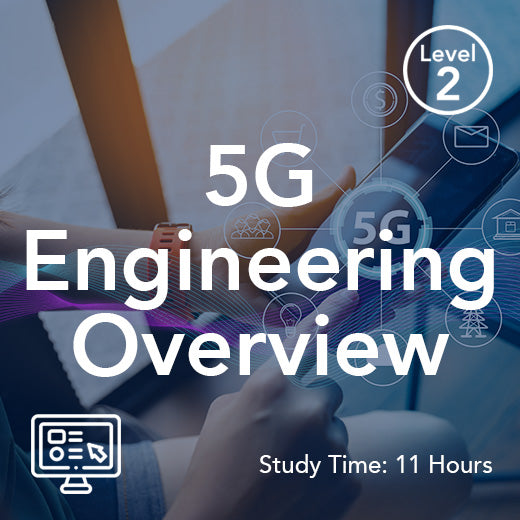
5G Engineering Overview (On-Demand)
This 5G Engineering Overview course is a technical overview of 5G. The course includes the design goals and development schedule for 5G, and the principles and architecture of the 5G air interface, radio access network and core network. This 5G Engineering Overview training course provides a comprehensive technical overview of 5G, including its design goals, development schedule, and the principles and architecture of the 5G air interface, radio access network, and core network. Engineers new to or already working in mobile communications will benefit from this course, gaining valuable insights into the latest advancements in 5G technology. Participants in this course are assumed to have familiarity with general engineering and telecommunications terminology, with some understanding of LTE cellular systems being beneficial. The course covers a range of topic areas, including 5G introduction and key features, standardization and timelines for 3GPP and the ITU, use cases and performance objectives, radio spectrum and millimeter wave communications, principles of radio transmission and reception in 5G, radio access network architecture, non-standalone and standalone deployment options, core network architecture, network function virtualization and network slicing, and interworking and compatibility between 5G, LTE, and Wi-Fi. Overall, this 5G Engineering Overview training course offers a valuable opportunity for engineers to deepen their understanding of 5G technology and its implications for mobile communications. This self-paced on-demand distance learning course features illustrated course books, videos, tests and full tutor support. Who would benefit This course is intended for engineers either new to, or already working in, mobile communications. Prerequisites Familiarity with telecommunications and general engineering terminology is assumed. Some understanding of LTE cellular systems would be beneficial. Topic Areas Include 5G introduction and key features Standardisation and timelines for 3GPP and the ITU Use cases and performance objectives Radio spectrum and millimetre wave communications Principles of radio transmission and reception in 5G Radio access network architecture Non standalone and standalone deployment options Core network architecture Network function virtualisation and network slicing Interworking and compatibility between 5G, LTE and Wi-Fi
£500.00
-
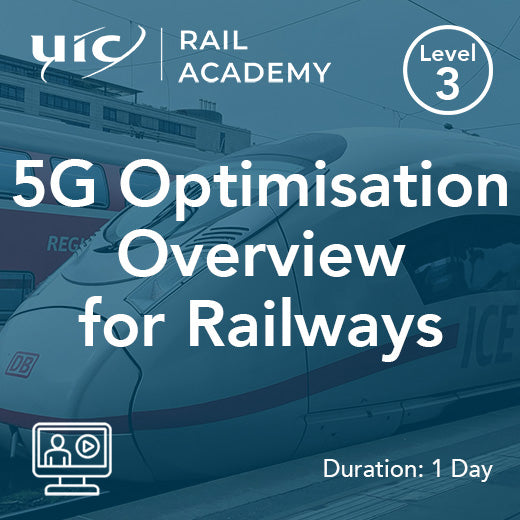
5G Engineering Overview for Railways
This 5G Engineering Overview for Railway course is a technical overview of 5G. The course includes the design goals and development schedule for 5G, and the principles and architecture of the 5G air interface, radio access network and core network. With the emergence of FRMCS our 5G Rail portfolio addresses the technical requirements of FRMCS. Who would benefit This course is intended for engineers either new to, or already working in, mobile communications. Prerequisites Familiarity with telecommunications and general engineering terminology is assumed. Some understanding of LTE cellular systems would be beneficial. Topic Areas Include 5G introduction and key features Standardisation and timelines for 3GPP and the ITU Use cases and performance objectives Radio spectrum and millimetre wave communications Principles of radio transmission and reception in 5G Radio access network architecture Non standalone and standalone deployment options Core network architecture Network function virtualisation and network slicing Interworking and compatibility between 5G, LTE and Wi-Fi
POA: Private Course
-
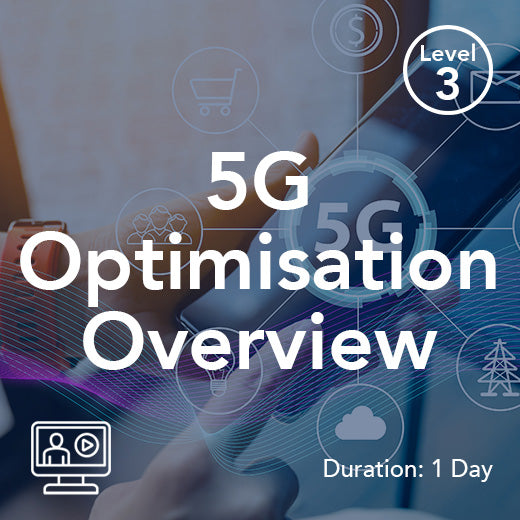
5G Optimisation Overview
Course Code: FG2305 An introduction to the principles of parameter setting and optimisation in the Next Generation Radio Access Network (NG-RAN). The material covered includes cell configuration, signal measurements, and parameters in idle and connected mode. Who Would Benefit? This course is intended for experienced radio access optimisers, and for those involved with device development or functionality testing in 5G systems. Prerequisites The course assumes an engineering background, with some knowledge of digital radio systems in general and the 5G air interface in particular. Experience of parameter tuning and optimisation for LTE would be useful. Course Contents Fundamentals of the 5G Air Interface RSRP, RSRQ and SINR Parameter Setting
POA: Private Course
-
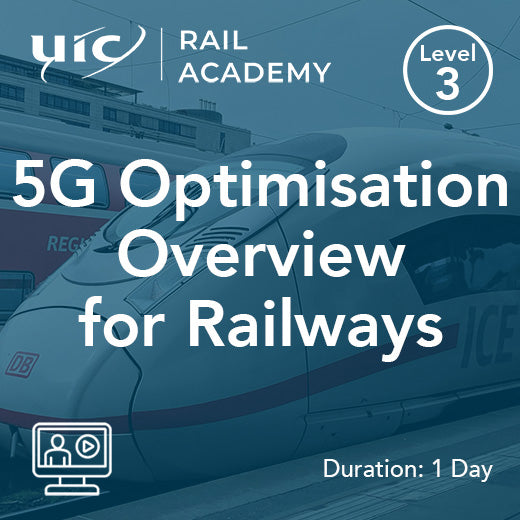
5G Optimisation Overview for Railways
5G Optimisation Overview for Railways provides an introduction to the principles of parameter setting and optimisation in the Next Generation Radio Access Network (NG-RAN). The material covered includes cell configuration, signal measurements, and parameters in idle and connected mode. With the emergence of FRMCS our 5G Rail portfolio addresses the technical requirements of FRMCS. Who Would Benefit? This course is intended for experienced radio access optimisers, and for those involved with device development or functionality testing in 5G systems. Prerequisites The course assumes an engineering background, with some knowledge of digital radio systems in general and the 5G air interface in particular. Experience of parameter tuning and optimisation for LTE would be useful. Course Contents Fundamentals of the 5G Air Interface RSRP, RSRQ and SINR Parameter Setting
POA: Private Course
-

5G Signalling Procedures - Technical Overview (On-Demand)
As 5G networks mature, a solid grasp of the procedures that govern how devices and network functions interact is essential for professionals working in planning, operations, or optimisation. This short course offers a technical overview of the core signalling and operational procedures in 5G Standalone (SA) networks. In just three hours, you'll explore how 5G procedures have evolved - from initial deployments that relied on LTE signalling to fully native 5G implementations across both the core and radio access network. The course covers the step-by-step processes involved in device registration, network function discovery, and session establishment and modification. You'll also gain insight into mobility management procedures, including how 5G handles transitions between different UE states - idle, connected, and inactive - and how it manages tasks like cell selection, registration updates, service requests, and handovers. The role of the Radio Resource Control (RRC) protocol in managing radio connections, reporting measurements, and supporting dual connectivity scenarios is also explained. This course is designed to provide technical professionals with a foundational understanding of how 5G devices and networks interact through signalling and procedure flows, forming the basis for reliable service delivery in real-world deployments. Course Contents 5G Procedures NF Service Registration, Discovery, Subscription and Notification Power-on Procedures Registration Procedure PDU Session Establishment Server-triggered PDU Session Modification and QoS Flow Establishment Change of PDU Session Anchor Mobility Management and Registration Update UE Triggered Service Request Procedure RNA Update and RRC Transitions Xn-based Handover Procedure Addition of a Secondary Node Access Network Release Procedure Signalling Procedures RRC Signalling Overview NSA and SA RRC Reconfiguration Message Overview RRC Measurements Procedures MR-DC Procedures
£95.00
-
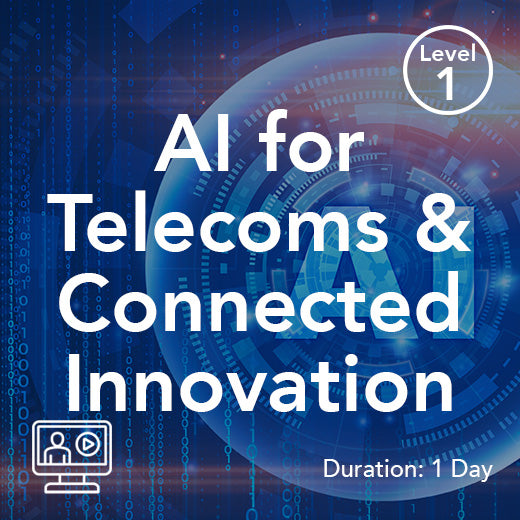
AI for Telecoms and Connected Innovation
Artificial intelligence (AI) is revolutionizing the telecoms industry and driving connected innovation to new heights. This comprehensive course delves into the role of AI in telecoms and explores its various applications, from machine learning to natural language processing, computer vision, and robotics. Participants will acquire a solid understanding of how AI is reshaping telecoms networks to be more efficient and sustainable, as well as its integration into evolving architectures to support cutting-edge use cases like the Metaverse, Intelligent Transportation, and Autonomous Driving. Moreover, the course highlights the synergy between AI and the Internet of Things (IoT), forming the powerful concept of AIoT (Artificial Intelligence of Things). Participants will discover how AI is catalyzing innovation across industries, enabling smarter cities, more efficient manufacturing processes, and personalized healthcare solutions. By the end of the program, participants will be well-versed in AI concepts and techniques, ready to apply their knowledge in telecoms and beyond. Whether pursuing further studies in AI or leveraging their expertise in diverse domains, participants will be equipped to navigate the exciting intersection of AI and telecoms innovation. In a rapidly evolving digital landscape, understanding the fundamentals of AI is essential for professionals in the telecoms industry. This course not only equips participants with practical skills in AI but also instills a deep appreciation for the ethical considerations and responsible implementation of AI technologies. With a focus on real-world applications and industry relevance, this course empowers participants to leverage AI to drive innovation, enhance efficiency, and unlock new possibilities in the dynamic realm of telecoms and connected innovation. Course Contents Introduction to Artificial Intelligence Machine Learning Applying Machine Learning to AI Natural Language Processing (NLP) Computer Vision Robotics and Autonomous Systems AI in Industry AIoT (Artificial Intelligence of Things) Ethics and Responsible AI
£980.00
-
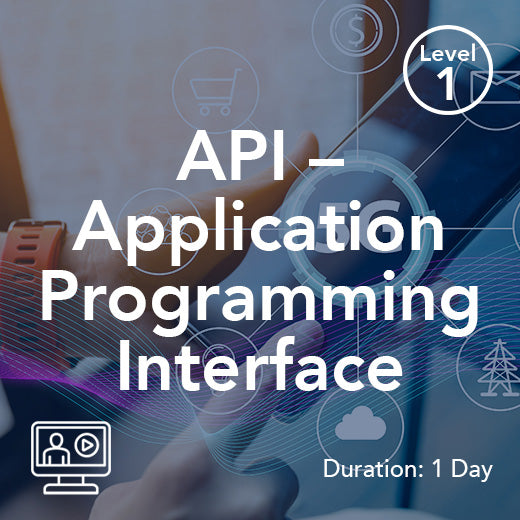
API – Application Programming Interface
For those looking to gain a comprehensive understanding of APIs and their application in Web Services and 5G Core Networks, the 1-day API Application Programming Interface course offered by Wray Castle is the perfect choice. This course is designed for individuals who want to delve into the intricacies of API standards, definitions, and their relevance in the realm of Web Services and 5G technology. Led by seasoned telecommunications trainer Maziar Shoaie, participants will explore topics such as 3GPP and 5G APIs, as well as the fundamentals of 5G Service Based Architecture (SBI). Participants are encouraged to have some prior knowledge or experience in packet-switched data network operations and Internet technology, along with a general understanding of 4G and 5G networks. Through a combination of theoretical learning and practical insights, attendees will gain valuable insights into the world of APIs and their significance in modern telecommunications. Join us for this intensive 1-day course and enhance your understanding of APIs in the context of Web Services and 5G Core Networks. Prerequisites Some knowledge or experience of packet-switched data network operation and Internet technology is beneficial. General knowledge about 4G and 5G. Course Contents Introduction to API API Standards and Definition API and Web Services 3GPP and 5G APIs 5G Service Based Architecture (SBI) Course Director: Maziar Shoaie Maziar is a seasoned telecommunications trainer with over 23 years of experience. He has delivered courses in more than 45 countries to customers from all over the world, including operators, vendors, and integrators. He is a core-network specialist with expertise in 2G, 3G, 4G, and 5G networks. and the developer of the Wray Castle 5G Lab and Workshop.
£980.00
-
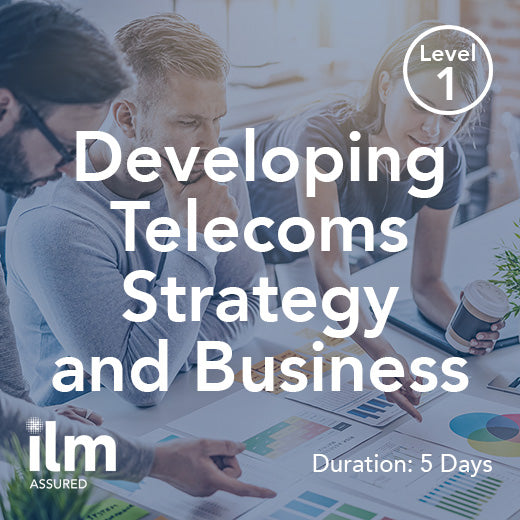
Developing Telecoms Strategy and Business
The Developing Telecoms Strategy and Business explores the key areas for business success, bringing the concepts together within a comprehensive team-based business simulation that runs throughout the programme - allowing the ideas to be developed and applied to a realistic and challenging simulated environment. The programme delivers comprehensive training for mid-senior managers, directors, specialists, consultants and identified talent working within the telecommunications, connected innovation, and adjacent industries. This programme has been assured by ILM. Assured status provides validation and recognition for the learner. It is a symbol of learning excellence and quality and is a reassurance that the training undertaken meets best practice standards. Focused Modules: Industry, Business & Tech Insight Telecoms Technology Evaluating & Optimising Business Models Controlling the Finances Leading, Developing & Supporting Effective People Creating & Communicating Compelling Customer Propositions Maintaining Effective Governance Optimising & Transformation (incl. Platforms & Processes) Who should attend? The programme is ideal for those in a telecoms-related management, leadership, or consultancy position within: Corporate organisations , working to ... grow and develop new and existing departments or divisions align departments or divisions to corporate strategy and vision Growing businesses that are making the transition to a sustainable long-term proposition Start-up departments Successfully complete the Developing Telecoms Strategy & Business to: Rapidly enhance your knowledge and competencies in the key areas of telecoms business. Establish a Blueprint for effectively leading your business or team. Implement all key aspects of the blueprint consistently and coherently. Develop more effective strategies, key performance enablers, and business models. Focus on maximising value creation for your organisation and your customers. Develop a solid understanding of telecoms technology and deployment options and how this impacts the business. Break those silo barriers. Better lead, support, and enhance the performance of your people. Take a more active role in evolving company culture, innovation and processes. Assess ideas and opportunities more rigorously and take a more dynamic leadership role. About ILM ILM is the UK's leading provider of leadership. coaching and management qualifications and training. We work with organisations in all sectors to help them define, develop and embed the leadership and management capability they need to succeed.ILM provides qualifications in leadership and management, coaching and mentoring and specialist areas such as social enterprise. We accredit 2,500 training experts to deliver our qualifications globally. Venue: King's Building, King's College London The King's Building, located on the Strand Campus. This historic landmark and stunning architectural masterpiece is a hub for innovation, learning, and cultural exchange. King's Building offers a unique blend of rich history and modernity, making it the perfect place for professional development and thought leadership. "The best classes I’ve attended focusing on Telco industry, very insightful and spot-on" CSC“Trainers were excellent. Really like how lively the classroom was, the class participation and energy is vibrant and positive.” CWC"Excellent training with great knowledge for the telecom industry" MS
POA: Private Course
-
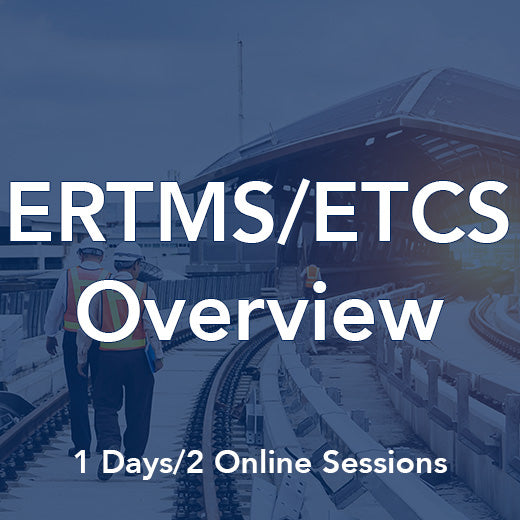
ERTMS/ETCS Overview
ERTMS/ETCS is a crucial system in the digitalization of the railway industry, aiming to increase capacity, reduce costs, lower carbon emissions, and enhance customer satisfaction. Our 1-day training course provides a comprehensive overview of ERTMS/ETCS for non-technical project managers in the railway sector. Participants will gain insights into the rationale, concept, installations, baselines, and specifications of ERTMS, as well as the system behavior, application levels, level transitions, trackside equipment, and more of ETCS. With a focus on essential topic areas such as signals, route, interlocking, on-board equipment, and vital computer systems, attendees will leave equipped with a solid understanding of ERTMS/ETCS. Whether you are looking to enhance your knowledge of the digital railway or seeking to stay ahead in the rapidly evolving railway industry, this course is designed to provide you with the necessary insights and expertise to navigate the complexities of ERTMS/ETCS effectively. Who would benefit This one day course is aimed at non-technical project managers that require an overview of ERTMS/ETCS. Prerequisites Delegates attending this course should be familiar with the railway industry. Topic Areas Include ERTMS Rationale and concept Standards organizations ERTMS Installations ERTMS Baselines ERTMS Specifications ETCS System behaviour ETCS Application levels ETCS Level transitions ERTMS Trackside equipment Train occupancy detection systems Signals, route and interlocking Multi-aspect signalling ERTMS On-board equipment European Vital Computer ERTMS DMI Position estimation Estimating the End of Authority Managing Movement Authorities ERTMS Operating Modes Supervision Train movements
POA: Private Course
-
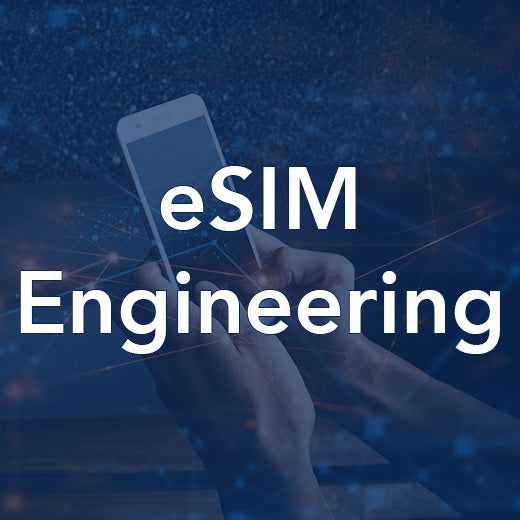
eSIM Engineering Overview
Our eSIM Engineering Overview Training Course provides a comprehensive technical overview of eSIM technology and the latest remote SIM provisioning specifications from GSMA. This course delves into the role of the SIM, the transition from physical to digital, system architectures for both M2M and Consumer applications, the evolution of eSIM, and a glimpse into the future of this technology. Engineers, product managers, and other professionals seeking to implement eSIM-based products and services will benefit greatly from this course. Participants are expected to have a general engineering background with some knowledge of GSM SIM technology. While not mandatory, a basic understanding of mobile networks would be advantageous. The course covers essential topics such as Introduction to eSIM, GSMA Consumer eSIM Specification, GSMA M2M eSIM Specification, GSMA Consumer eSIM Specification Enhancements, and The Future of eSIM. Who would benefit The course is intended for engineers, product managers and other staff who are looking to prepare for or actively roll out eSIM-based products and services within their organisations. Prerequisites A general engineering background with some knowledge of GSM SIM technology is assumed. A basic understanding of mobile networks would be desirable. Topic Areas Include Introduction to eSIM GSMA Consumer eSIM Specification GSMA M2M eSIM Specification GSMA Consumer eSIM Specification Enhancements The Future of eSIM
POA: Private Course
-
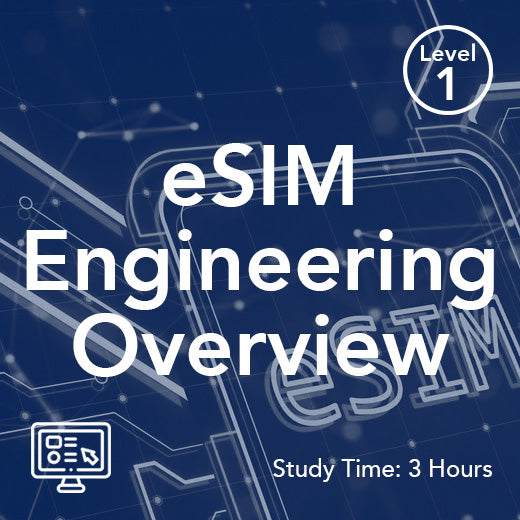
eSIM Engineering Overview (On-Demand)
Our eSIM Engineering Overview Training Course provides a comprehensive technical overview of eSIM technology and the latest remote SIM provisioning specifications from GSMA. This course delves into the role of the SIM, the transition from physical to digital, system architectures for both M2M and Consumer applications, the evolution of eSIM, and a glimpse into the future of this technology. Engineers, product managers, and other professionals seeking to implement eSIM-based products and services will benefit greatly from this course. Participants are expected to have a general engineering background with some knowledge of GSM SIM technology. While not mandatory, a basic understanding of mobile networks would be advantageous. The course covers essential topics such as Introduction to eSIM, GSMA Consumer eSIM Specification, GSMA M2M eSIM Specification, GSMA Consumer eSIM Specification Enhancements, and The Future of eSIM. This self-paced on-demand distance learning course features illustrated course books, videos, tests and full tutor support. Who would benefit The course is intended for engineers, product managers and other staff who are looking to prepare for or actively roll out eSIM-based products and services within their organisations. Prerequisites A general engineering background with some knowledge of GSM SIM technology is assumed. A basic understanding of mobile networks would be desirable. Topic Areas Include Introduction to eSIM GSMA Consumer eSIM Specification GSMA M2M eSIM Specification GSMA Consumer eSIM Specification Enhancements The Future of eSIM
£95.00
-
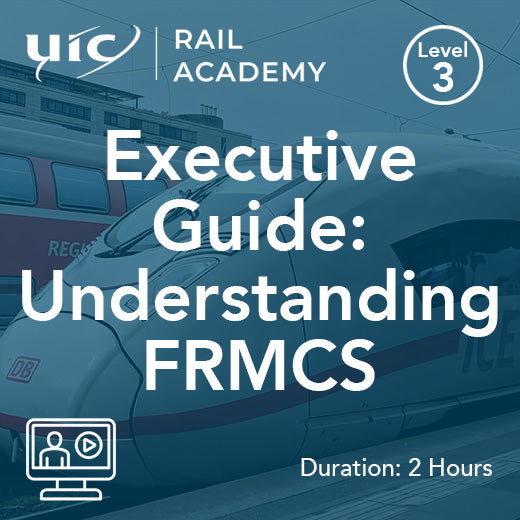
Executive Guide: Understanding FRMCS
This concise executive briefing provides a high-level overview of the Future Railway Mobile Communication System (FRMCS), the next-generation communication standard for railways, is designed to assist executives seeking to understand the impact and opportunities arising from this new technology. The course explains what FRMCS is, the implication of some of the technical changes on the requirements for physical assets, why it is essential, and the implementation timeline for the migration from GSM-R. Participants will explore the architectural framework, key challenges in deployment, and the business opportunities it presents. Designed for busy executives, this course delivers practical insights in an accessible format.Prerequisites No prior knowledge of FRMCS, GSM-R, or telecommunications is required. This course is designed for those new to the topic, ensuring all acronyms are explained, and foundational concepts are introduced. Who Would Benefit Executives outside of rail companies charged with understanding the business impact or opportunity of FRMCS to their business, for example those already working in the railway ecosystem, those seeking business development opportunities in the rail sector, or those within the telecommunications sector seeking to explore the opportunity offered by FRMCS. Sales professionals preparing for client meetings or presentations involving railway communication systems. Business development / strategy development executives / managers exploring opportunities in the rail and telecom sectors. Policy-makers and regulators overseeing railway digitalisation efforts.Engineers and project managers who need a foundational understanding of FRMCS to support project planning or cross-functional collaboration. Course Contents Introduction GSM-R: The Context Why GSM Needs Replacement Introducing FRMCS FRMCS Challenges Stakeholders and Business Opportunities Timeline
POA: Private Course
-
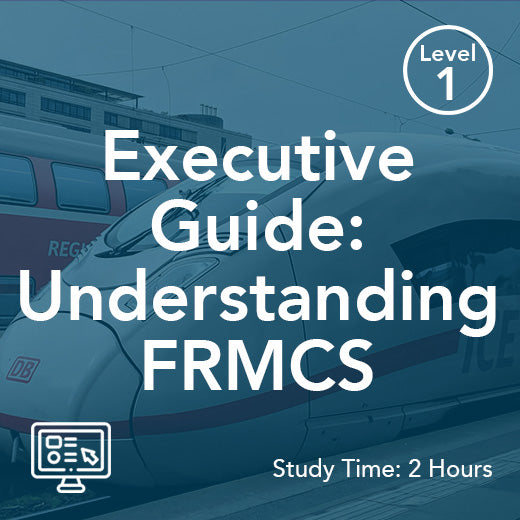
Executive Guide: Understanding FRMCS (On-Demand)
This concise executive briefing provides a high-level overview of the Future Railway Mobile Communication System (FRMCS), the next-generation communication standard for railways, is designed to assist executives seeking to understand the impact and opportunities arising from this new technology. The course explains what FRMCS is, the implication of some of the technical changes on the requirements for physical assets, why it is essential, and the implementation timeline for the migration from GSM-R. Participants will explore the architectural framework, key challenges in deployment, and the business opportunities it presents. Designed for busy executives, this course delivers practical insights in an accessible format.Prerequisites No prior knowledge of FRMCS, GSM-R, or telecommunications is required. This course is designed for those new to the topic, ensuring all acronyms are explained, and foundational concepts are introduced. Who Would Benefit Executives outside of rail companies charged with understanding the business impact or opportunity of FRMCS to their business, for example those already working in the railway ecosystem, those seeking business development opportunities in the rail sector, or those within the telecommunications sector seeking to explore the opportunity offered by FRMCS. Sales professionals preparing for client meetings or presentations involving railway communication systems. Business development / strategy development executives / managers exploring opportunities in the rail and telecom sectors. Policy-makers and regulators overseeing railway digitalisation efforts.Engineers and project managers who need a foundational understanding of FRMCS to support project planning or cross-functional collaboration. Course Contents Introduction GSM-R: The Context Why GSM Needs Replacement Introducing FRMCS FRMCS Challenges Stakeholders and Business Opportunities Timeline rail
£250.00
-
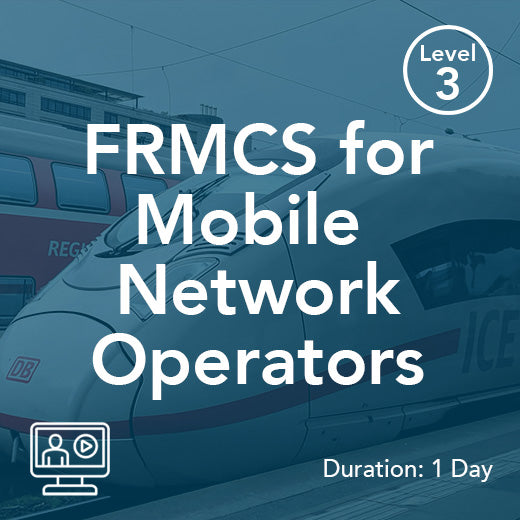
FRMCS For Mobile Network Operators
Railways worldwide have relied on GSM-R, a specialised adaptation of commercial GSM technology, for critical train-to-controller voice communications and digital signalling for over 15 years. However, GSM-R is reaching the end of its lifecycle and will become obsolete by 2035. The International Union of Railways (UIC) has launched the Future Railway Mobile Communications System (FRMCS) project to design and implement the next-generation communication system. Unlike its predecessor, FRMCS leverages cutting-edge 5G technology and offers mobile network operators (MNOs) a unique opportunity to contribute to this transformative shift in railway communications. This course provides an in-depth overview of FRMCS, highlighting: The transition from GSM-R to FRMCS, including timelines and standards. Planned 5G-based network architecture. Key challenges, such as spectrum allocation, coverage, and capacity. The critical role of MNOs, from infrastructure sharing to delivering broadband services. Tailored for mobile network operators, this course equips participants with the insights needed to engage with the FRMCS initiative, seize new opportunities, and contribute to the success of the next-generation railway communication system.
POA: Private Course
-
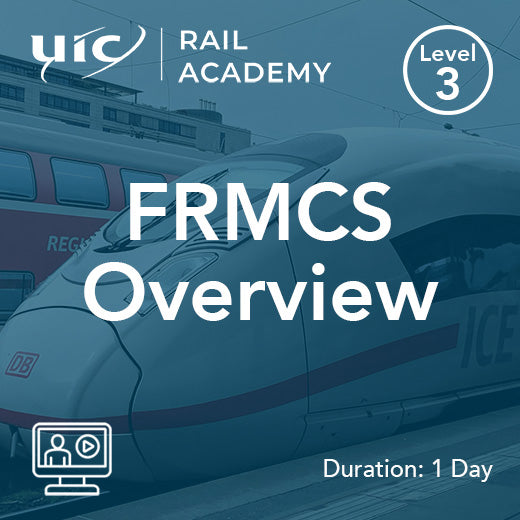
FRMCS V2 Overview (Live)
This course is aimed at non-technical people or those in management roles that need an introduction to FRMCS. It outlines the need for FRMCS and introduces the standards that are required. The course also discusses the issues with the current radio spectrum allocations and how FRMCS and GSM-R may co-exist in the rollout phase. Also discussed the technology known as 5G that will be an integral part of FRMCS. Now fully updated to include FRMCS V2 specifications Course Contents FRMCS – An Introduction FRMCS Reference Architecture 5G Mission Critical Architecture and Procedures Radio Planning and Migration MCVideo Certified by Institution of Railway Signal Engineers (IRSE) The Institution of Railway Signal Engineers (IRSE) certifies that the syllabus for the FRMCS Overview course is appropriate for meeting the stated objectives of that course. For more information about the scope of the certification process provided by the IRSE please see the IRSE website www.irse.org.
£1,336.00
-
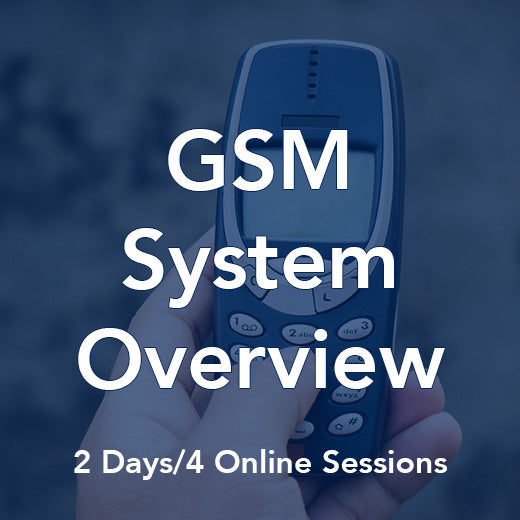
GSM System Overview
A technical introduction to the world of GSM. This course describes the services, structure and operation of a GSM mobile network. Our GSM System Overview Training Course is designed to provide a technical introduction to the world of GSM. This course offers a comprehensive overview of the services, structure, and operation of a GSM mobile network. Whether you are new to the GSM industry or looking to enhance your understanding of GSM network operation and associated technologies, this course is perfect for you. Over the course of 2 days and 4 live online sessions (0900-1230), participants will delve into key topic areas including GSM organizations and standards bodies, GSM services and service enablers, network architecture, GSM/GPRS identities, GSM EDGE radio access network, and more. With a focus on real-world network configurations and network sharing, this course will equip you with the knowledge and skills needed to excel in the GSM industry. Join us for our GSM System Overview Training Course and gain a solid foundation in GSM technology. With a basic understanding of cellular radio networks and associated technologies, as well as the ability to comprehend technical subjects, you will be well-prepared to navigate the complexities of GSM networks and drive innovation in the industry. Who would benefit Those new to or entering the GSM industry who require a technical overview of GSM network operation and its associated technologies. Prerequisites A basic understanding of cellular radio networks and associated technologies, as well as an ability to comprehend technical subjects, is an advantage. Topic Areas Include GSM organizations and standards bodies GSM services and service enablers Network architecture GSM/GPRS identities GSM EDGE radio access network GSM channels Cell coverage and capacity Propagation issues Core network architecture GPRS network architecture Idle mode procedures Dedicated mode procedures GPRS procedures GSM family evolution Real-world network configuration Network sharing
POA: Private Course
-
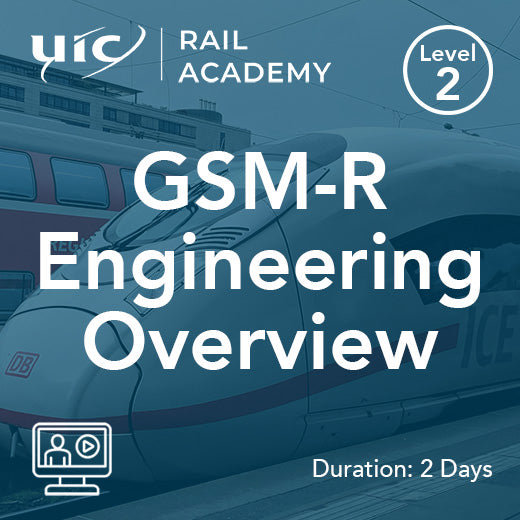
GSM-R Engineering Overview (Live)
The 2-day GSM-R Engineering Overview Training Course offered by Wray Castle is a comprehensive program designed for network engineers looking to deepen their understanding of GSM-R networks and operations. Part of the UIC Rail Academy, this course covers all principles of GSM-R networks and provides a detailed study of the services, features, and technology involved. Ideal for individuals in technical roles within the rail industry, this course offers a broad overview of GSM-R services and technology. Participants will gain insights into GSM and GSM-R networks, network architectures, identities, coverage, procedures, and the European Train Control System. A basic understanding of cellular radio networks and railway signaling is recommended as a prerequisite for this course. Who would benefit Those in or entering technical roles within the GSM-R industry who require a broad overview of the services, features and technology of GSM-R. Prerequisites A basic understanding of cellular radio networks and railway signalling, as well as the ability to comprehend technical subjects, would be useful. Topic Areas Include Introduction to GSM and GSM-R Networks GSM Network Architecture GPRS Network Architecture GSM-R Network Architecture GSM-R Services GSM-R Identities GSM-R Coverage Network Access GSM-R Procedures European Train Control System Certified by Institution of Railway Signal Engineers (IRSE) The Institution of Railway Signal Engineers (IRSE) certifies that the syllabus for the GSM-R-Engineering course is appropriate for meeting the stated objectives of that course. For more information about the scope of the certification process provided by the IRSE please see the IRSE website www.irse.org. Also available as a Self-Study Online Learning Programme, learn more.
£1,815.00
-
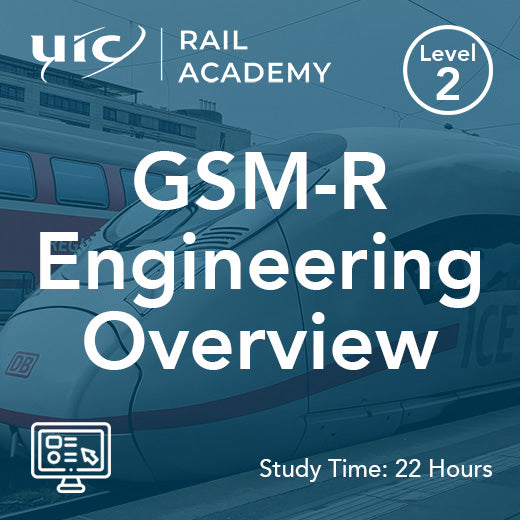
GSM-R Engineering Overview (On-Demand)
The GSM-R Engineering Overview Training Course is a comprehensive program designed for network engineers looking to deepen their understanding of GSM-R networks and operations. Part of the UIC Rail Academy, this course covers all principles of GSM-R networks and provides a detailed study of the services, features, and technology involved. Ideal for individuals in technical roles within the rail industry, this course offers a broad overview of GSM-R services and technology. Participants will gain insights into GSM and GSM-R networks, network architectures, identities, coverage, procedures, and the European Train Control System. A basic understanding of cellular radio networks and railway signaling is recommended as a prerequisite for this course. Who would benefit Those in or entering technical roles within the GSM-R industry who require a broad overview of the services, features and technology of GSM-R. Prerequisites A basic understanding of cellular radio networks and railway signalling, as well as the ability to comprehend technical subjects, would be useful. Topic Areas Include Introduction to GSM and GSM-R Networks GSM Network Architecture GPRS Network Architecture GSM-R Network Architecture GSM-R Services] GSM-R Identities GSM-R Coverage Network Access GSM-R Procedures European Train Control System Certified by Institution of Railway Signal Engineers (IRSE) The Institution of Railway Signal Engineers (IRSE) certifies that the syllabus for the GSM-R Engineering course is appropriate for meeting the stated objectives of that course. For more information about the scope of the certification process provided by the IRSE please see the IRSE website www.irse.org.
£1,820.00
-
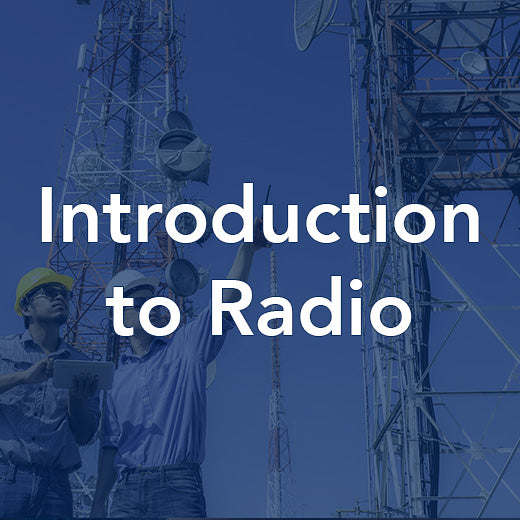
Introduction to Radio
Expand your knowledge of radio technology with our Introduction to Radio Training Course. This one-day course will provide you with a comprehensive understanding of how the radio spectrum is managed, the systems that utilize spectrum, and the technical aspects of radio system design. Whether you are a senior executive, manager, regulator, market analyst, or marketeer in the telecommunications industry, this course is designed to equip you with the knowledge and insights necessary to navigate the complexities of radio spectrum management. Our course covers a wide range of topic areas, including how radio spectrum is regulated, the concepts of bandwidth and channels, antenna characteristics, radio wave propagation mechanisms, and the impact of interference and noise. Additionally, you will gain an overview of various radio systems such as 2G, 3G, and 4G, and explore the factors driving the demand for spectrum. This course is tailored for individuals with no technical background, making it accessible to a diverse range of professionals seeking to enhance their understanding of radio technology. Join us for our Introduction to Radio Training Course and stay ahead of the curve in the ever-evolving world of radio technology. Gain valuable insights into the management and use of radio spectrum, align radio applications to frequency bands, and explore the latest advancements driving the demand for spectrum. Don't miss this opportunity to expand your knowledge and expertise in radio technology. Who would benefit Senior executives, managers, regulators, market analysts and marketeers involved in the telecommunications industry who require an understanding of the wide range of issues surrounding the use and management of radio spectrum. Prerequisites This course is designed for those with no technical background. Topic Areas Include How radio spectrum is managed and regulated How radio spectrum is used The concepts of bandwidth and channels An introduction to the characteristics of antennas Radio wave propagation mechanisms The impact of interference and noise Aligning radio applications to frequency bands Overview of radio systems – including 2G, 3G and 4G What is driving the demand for spectrum? Health and Safety issues
POA: Private Course
-
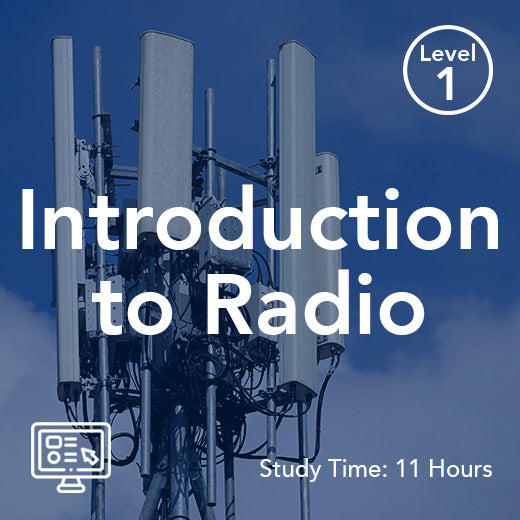
Introduction to Radio (On-Demand)
Expand your knowledge of radio technology with our Introduction to Radio Training Course. This short online self study course will provide you with a comprehensive understanding of how the radio spectrum is managed, the systems that utilize spectrum, and the technical aspects of radio system design. Whether you are a senior executive, manager, regulator, market analyst, or marketeer in the telecommunications industry, this course is designed to equip you with the knowledge and insights necessary to navigate the complexities of radio spectrum management. Our course covers a wide range of topic areas, including how radio spectrum is regulated, the concepts of bandwidth and channels, antenna characteristics, radio wave propagation mechanisms, and the impact of interference and noise. Additionally, you will gain an overview of various radio systems such as 2G, 3G, and 4G, and explore the factors driving the demand for spectrum. This course is tailored for individuals with no technical background, making it accessible to a diverse range of professionals seeking to enhance their understanding of radio technology. Join us for our Introduction to Radio Training Course and stay ahead of the curve in the ever-evolving world of radio technology. Gain valuable insights into the management and use of radio spectrum, align radio applications to frequency bands, and explore the latest advancements driving the demand for spectrum. Don't miss this opportunity to expand your knowledge and expertise in radio technology. This self-paced on-demand distance learning course features illustrated course books, videos, tests and full tutor support. Who would benefit Senior executives, managers, regulators, market analysts and marketeers involved in the telecommunications industry who require an understanding of the wide range of issues surrounding the use and management of radio spectrum. Prerequisites This course is designed for those with no technical background. Topic Areas Include How radio spectrum is managed and regulated How radio spectrum is used The concepts of bandwidth and channels An introduction to the characteristics of antennas Radio wave propagation mechanisms The impact of interference and noise Aligning radio applications to frequency bands Overview of radio systems – including 2G, 3G and 4G What is driving the demand for spectrum? Health and Safety issues
£500.00
-
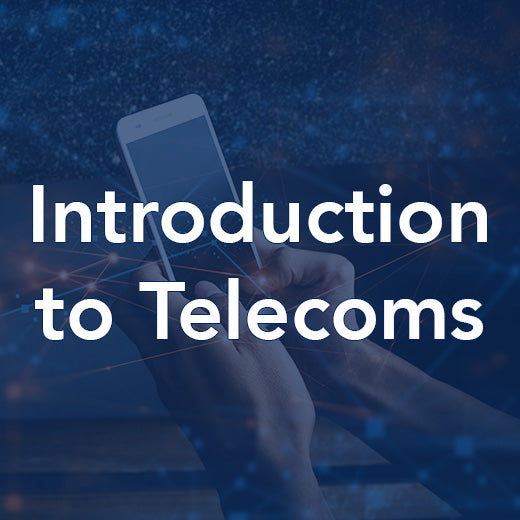
Introduction to Telecoms
The Introduction to Telecoms Training Course is designed to provide participants with a comprehensive understanding of the core technologies used in fixed, mobile, and IP-based telecoms networks. Over the course of 3 days, attendees will delve into the fundamentals of networking technologies, including switching, transmission, and signalling, as well as the services that they support. The training also covers next-generation networking in an all-IP environment, ensuring that participants are equipped with the knowledge needed to excel in the telecommunications industry. Ideal for those currently working in or looking to enter the telecommunications field, this course is perfect for individuals who need a solid grasp of the functions and services offered by modern networks. Participants should have a basic mathematical ability and a technical aptitude, with the intention to pursue a technical role in the industry. By exploring topics such as telecoms evolution, network components and services, and mobile cellular systems, attendees will gain valuable insights into the ever-evolving world of telecommunications. Who would benefit Those working in or entering the telecommunications industry who need to understand the functions and services provided by modern networks. Prerequisites Mathematical ability and aptitude for technical subjects, with the intention to progress in a technical role. Topic Areas Include Telecoms evolution Network components and services The PSTN and ISDN: access and core networks Basic analogue and digital information concepts Time division multiplexing and switching techniques Transmission systems: PDH, SDH, WDM and OTN Mobile cellular systems: 2G, 2.5G, 3G, 4G/LTE and 5G Packet-switched techniques IP, Ethernet, the Internet, ISPs and Internet Services Fixed and Mobile Broadband access technologies Next Generation fixed and mobile networks IP Multimedia Subsystem
£2,660.00
-
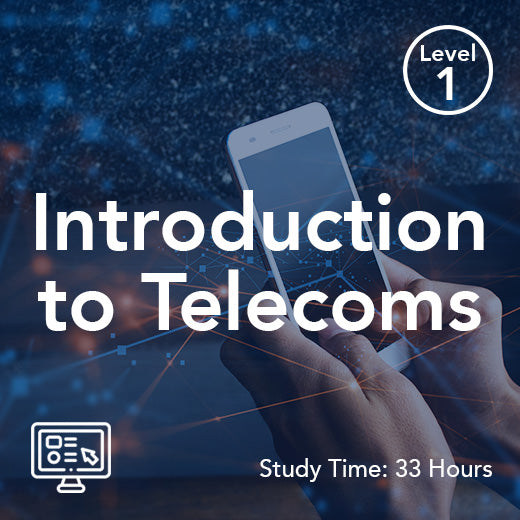
Introduction to Telecoms (On-Demand)
The Introduction to Telecoms Training Course is designed to provide participants with a comprehensive understanding of the core technologies used in fixed, mobile, and IP-based telecoms networks. Learners will delve into the fundamentals of networking technologies, including switching, transmission, and signalling, as well as the services that they support. The training also covers next-generation networking in an all-IP environment, ensuring that participants are equipped with the knowledge needed to excel in the telecommunications industry. Ideal for those currently working in or looking to enter the telecommunications field, this course is perfect for individuals who need a solid grasp of the functions and services offered by modern networks. Participants should have a basic mathematical ability and a technical aptitude, with the intention to pursue a technical role in the industry. By exploring topics such as telecoms evolution, network components and services, and mobile cellular systems, attendees will gain valuable insights into the ever-evolving world of telecommunications. This self-paced on-demand distance learning course features illustrated course books, videos, tests and full tutor support. Who would benefit Those working in or entering the telecommunications industry who need to understand the functions and services provided by modern networks. Prerequisites Mathematical ability and aptitude for technical subjects, with the intention to progress in a technical role. Topic Areas Include Telecoms evolution Network components and services The PSTN and ISDN: access and core networks Basic analogue and digital information concepts Time division multiplexing and switching techniques Transmission systems: PDH, SDH, WDM and OTN Mobile cellular systems: 2G, 2.5G, 3G and 3.5G Packet-switched techniques IP, Ethernet, the Internet, ISPs and Internet Services Fixed and Mobile Broadband access technologies Next Generation fixed and mobile networks IP Multimedia Subsystem Also available as a Live Online Training Programme, learn more.
£2,660.00
-
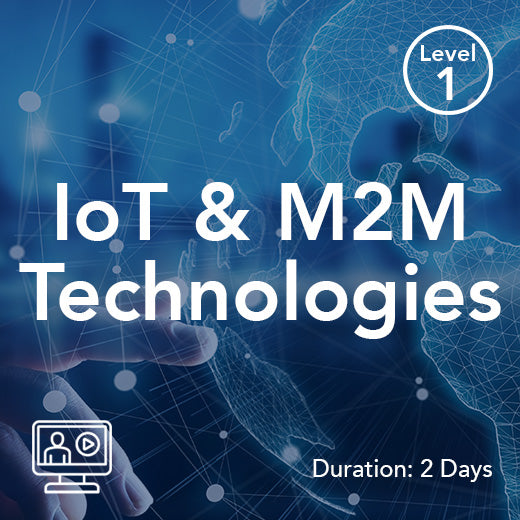
IoT and M2M Technologies
Our IoT and M2M Technologies course is designed to provide a comprehensive overview of both existing and emerging technologies in the field. Ideal for those involved in IoT and M2M projects or looking to explore related opportunities, this course covers the scope, potential applications, use cases, and deployment options available. Participants will gain insight into the technologies and techniques necessary to efficiently deploy and operate supporting infrastructure such as devices, SIM cards, networks, platforms, and the wider ecosystem. This course delves into industry and global models, identifying the major requirements of modern M2M systems and exploring how these requirements can be met using existing and emerging technologies. Participants will gain a thorough understanding of Cellular M2M, including the latest 5G techniques like NB-IoT and CIoT, MTC for LTE, and legacy GPRS deployments. Additionally, the course covers M2M eSIM remote profile provisioning, a crucial aspect of managing device connectivity in IoT and M2M applications. Ideal for industry professionals seeking to upskill in IoT technologies or those focusing on specific aspects of IoT and M2M solutions, this course provides a solid foundation for assessing, driving, or developing IoT opportunities within their organizations. Join us for 2 days and 4 live online sessions with our experienced trainer, Tony Wakefield, to gain valuable insights into the world of IoT and M2M technologies. Who would benefit The course is an ideal foundation for … those working in the industry who need to rapidly upskill to help assess, driveor develop IoT opportunities within their own organisation further study for those focusing on particular IoT / M2M technologies, or specific aspects of IoT / M2M solutions Topic Areas Include Introduction to IoT/M2M Principles of Mobile Cellular Networks Cellular M2M Systems eSIM for M2M MTC – including LTE-M, NB-IoT and CIoT 5G - Enabling IoT and M2M M2M Security Trainer: Tony Wakefield Tony is an experienced technical trainer and competency development specialist having worked with a diverse and extensive base of companies. He has spoken at global conferences and has extensive experience in facilitating programmes, specialising in 5G and the wider aspects of telecoms and connected innovation.
POA: Private Course
-
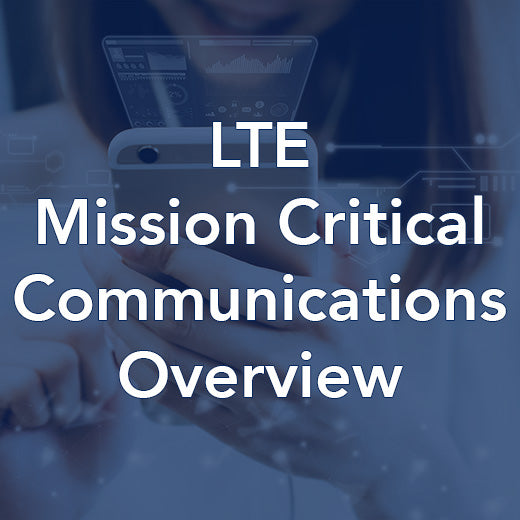
LTE Mission Critical Communications Overview
LTE Mission Critical Communications Overview Training Course is designed for members of the emergency services, network operators, and individuals seeking a comprehensive understanding of how LTE technology can support Mission Critical Communications. This course is ideal for those with a technical background or a foundation level of understanding in the field of telecommunications. Participants will delve into topics such as the requirements of a Mission Critical Network, an introduction to LTE, the LTE Radio Interface, Mission Critical Push to Talk (MCPTT), and Proximity Services (ProSe). By the end of the course, attendees will have a solid grasp of how LTE technology can enhance and support critical communications in various scenarios. Join us for this informative and practical training course to gain valuable insights into LTE Mission Critical Communications and how it can revolutionize communication systems for emergency services and network operators. Don't miss this opportunity to expand your knowledge and skills in this crucial area of telecommunications. Who Would Benefit This course benefits members of the emergency services; network operators and those seeking an overall description of how LTE can support Mission Critical Communications. Prerequisites The course is intended for those with a technical background or foundation level of understanding in telecommunications. Course Contents Requirements of a Mission Critical Network Introduction to LTE The LTE Radio Interface Mission Critical Push to Talk (MCPTT) Proximity Services (ProSe)
£980.00
-
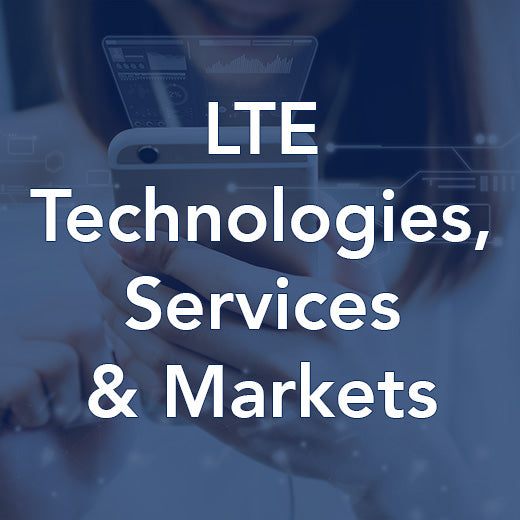
LTE Technologies, Services and Markets
LTE technologies are at the forefront of the telecommunications industry, offering faster speeds and more reliable connections for both mobile and fixed services. Our LTE Technologies, Services, and Markets training course (Course Code: LT3601) provides a comprehensive overview of the Evolved Packet System (EPS) that makes up the LTE system. This course is designed for non-technical professionals who are new to or already working in the telecommunications sector, offering a non-technical introduction to LTE and its place in the evolving telecom market. With 2 live online sessions spread over 1 day, participants will gain an understanding of LTE services, market segments, target users, key features, network architecture, and technology roadmaps toward LTE. No technical knowledge is assumed, making this course accessible to individuals with varying levels of experience in the industry. By exploring the applications and synergies of LTE technology, participants will be equipped with the knowledge needed to navigate the dynamic landscape of LTE services and markets. Join us for this informative training course to stay ahead in the telecommunications industry and gain insights into the advancements and opportunities offered by LTE technologies. Whether you are looking to expand your knowledge or enhance your skill set, this course will provide you with valuable insights into the world of LTE and its impact on the telecommunications sector. Who would benefit This course is intended for non-technical professionals either new to, or already working in, the mobile or fixed telecommunications sector. Prerequisites No technical knowledge is assumed but some familiarity with the telecommunications industry would be beneficial. Topic Areas Include The evolving mobile telecommunications market LTE services and service aims LTE market segments LTE target users Key features of LTE LTE network terminology E-UTRAN architecture Evolved Packet Core (EPC) architecture Why all-IP? LTE for fixed and mobile services Technology roadmaps toward LTE LTE timescales Applications for LTE LTE technology synergies
POA: Private Course
-
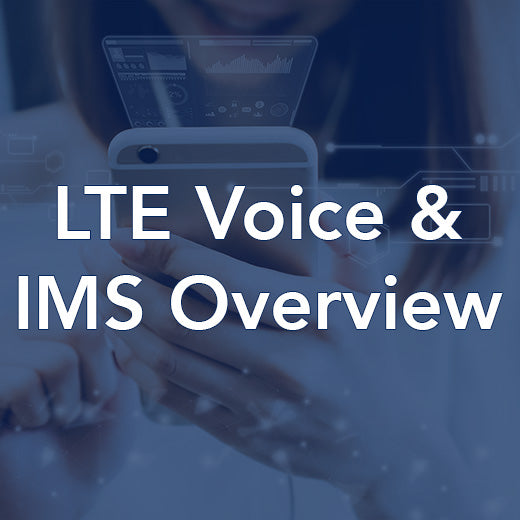
LTE Voice and IMS Overview
Our LTE Voice and IMS Overview training course is designed to provide a comprehensive technical understanding of the IP Multimedia Subsystem (IMS) and how it is utilized for delivering VoIP services over LTE networks. This 3-day course is ideal for engineering and technical management professionals seeking in-depth knowledge of LTE voice delivery and real-time traffic handling. Participants will gain insights into various topics including LTE technical overview, SIP and SDP protocols, IMS architecture and operation, VoLTE system architecture, protocols, services, and codecs, as well as emergency call procedures and Voice over Wi-Fi. Prerequisites for this course include prior attendance of our LTE Engineering Overview course or equivalent basic LTE knowledge, along with a working understanding of IP. By enrolling in our LTE Voice and IMS Overview training, participants will enhance their expertise in LTE voice delivery mechanisms and gain valuable insights into the operation of the IP Multimedia Subsystem. Stay ahead in the rapidly evolving telecommunications industry with our specialized training designed to equip you with the necessary skills and knowledge for successful implementation of VoIP services over LTE networks. Who would benefit This course is suitable for engineering and technical management staff who require a technical description of the options that exist in LTE and the IP multimedia subsystem for delivering voice and other real-time traffic types, that would traditionally have been carried by Circuit-Switched (CS) technologies. Prerequisites Attendance on this course assumes previous attendance on the LTE Engineering Overview course (LT3600) or equivalent basic LTE knowledge (although a recap of basic LTE architecture and concepts is provided at the start of the course) and also assumes a working knowledge of IP. Topic Areas Include Technical overview of LTE Introduction to the options for LTE voice Session Initiation Protocol (SIP) Session Description Protocol (SDP) Architecture and operation of the IP Multimedia Subsystem (IMS) Control and user plane functions of the IMS Service delivery in the IMS System architecture for Voice over LTE (VoLTE) VoLTE protocols, services and codecs VoLTE power-on and registration procedures VoLTE call setup procedures Access domain selection Single Radio Voice Call Continuity (SRVCC) Delivery of SMS messages over the IMS VoLTE emergency calls Voice over Wi-Fi
POA: Private Course
-
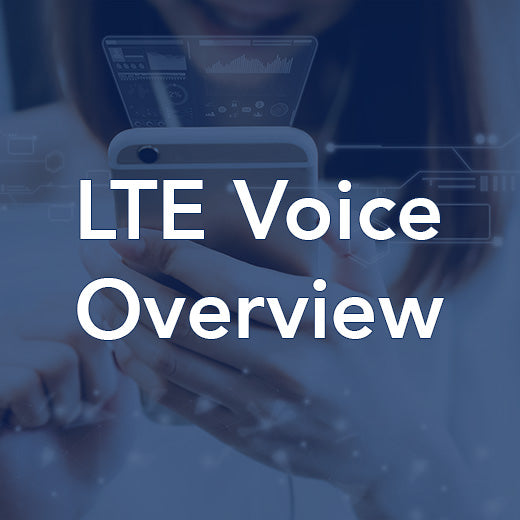
LTE Voice Overview
LTE Voice Overview Training Course provides a comprehensive technical introduction to LTE voice methods. This course is designed for engineering and technical management professionals who need a clear understanding of the options available for delivering voice services over LTE networks. Participants will gain insight into the architecture, protocols, and codecs for Voice over LTE (VoLTE), as well as learn about CS fallback, IMS, SRVCC, and other key topics related to LTE voice technology. Prerequisites for attending this course include prior completion of the LTE Engineering Overview course or equivalent basic knowledge of LTE. However, a recap of fundamental LTE concepts and architecture is provided at the beginning of the training session. By the end of the 1-day course, participants will have a solid understanding of LTE voice technologies and procedures, including power-on, registration, call setup, SMS, emergency calls, and Voice over Wi-Fi. Enhance your expertise in LTE voice with this informative and practical training course. Who would benefit This course is suitable for engineering and technical management staff who require a concise introduction to the options that exist in LTE for the delivery of voice services. Prerequisites Attendance on this course assumes previous attendance on the LTE Engineering Overview course (LT3600) or equivalent basic LTE knowledge (although a recap of basic LTE architecture and concepts is provided at the start of the course). Topic Areas Include Technical overview of LTE Introduction to the options for LTE voice Architecture and operation of CS fallback Overview of the IMS System architecture, protocols and codecs for Voice over LTE (VoLTE) VoLTE procedures for power-on, registration and call setup Single Radio Voice Call Continuity (SRVCC) Additional topics such as SMS, emergency calls and Voice over Wi-Fi
POA: Private Course
-
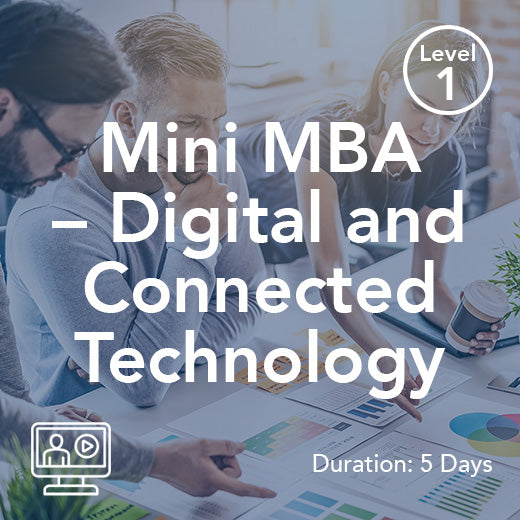
Mini MBA – Digital and Connected Technology
Businesses that are transitioning to, or are underpinned by digital and connected technology face a unique set of challenges compared to traditional organisations. As companies move into new areas of development and operation, it is critical that management teams across the organisation embrace the fast pace of change and realignment - whilst continuing to maximise their existing opportunities. The goal is an agile and flexible organisation that is aligned on strategic imperatives, fully focused on customer requirements and the value-exchange, and with an enhanced ability to collaborate and partner within complex ecosystems.This programme is designed to provide an excellent foundation on which senior managers can fast-track their competency development within the relevant areas. We take a comprehensive look at the business environment, industry trends and drivers, technologies and frameworks, financial aspects if digital and hi-tech, customer proposition, strategy, business models and positioning – and critically, at how it all fits together.Participants will significantly enhance their capabilities in terms of strategy-setting and alignment, evaluation and decision-making, business model development, alignment of departments and teams to strategic imperatives, and people / culture development. Delivery and Programme Schedule: Group Work, Business Simulation and Case Studies: These run throughout the programme and are designed to enable participants to explore and share ideas, identify best practice, build confidence, and develop a shared view of a future position. Focused Modules: Hi-Tech - Business Environment and Use Cases Digital and Connected Technologies Explained Finance for Hi-Tech Business Models Innovation – Methods and Innovation Sprint Strategy, Business Models and the Customer Proposition This programme is aimed at: Senior or (aspiring senior) managers involved in hi-tech industries that are underpinned by digital and connected technology Those who need to rapidly build their knowledge and competencies in order to maximise their contribution to their organisation, and to lead their team(s) effectively. Those working with, or making decisions that are impacted by emerging opportunities and trends within hi-tech industries. Management teams – enabling a candid and hard-hitting evaluation of the status quo, alignment of ideas, and development of a shared future vision For pricing options contact us on: info@wraycastle.com
POA: Private Course
-
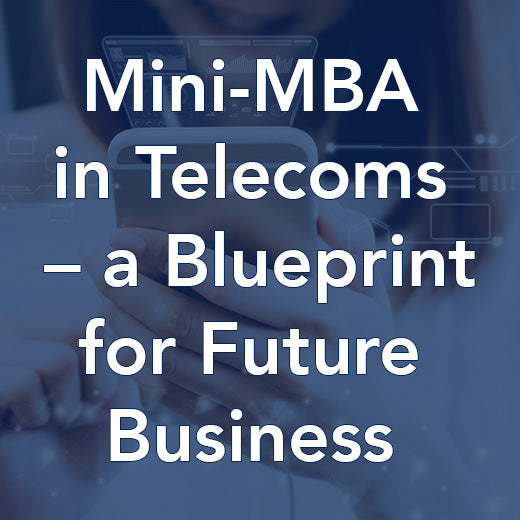
Mini-MBA in Telecoms – a Blueprint for Future Business
A comprehensive Telecoms Mini-MBA programme covering all the essential elements needed to effectively lead and manage in Telecoms and related industries The Mini-MBA in Telecoms explores the key areas for business success, bringing the concepts together within a comprehensive team-based business simulation that runs throughout the programme - allowing the ideas to be developed and applied to a realistic and challenging simulated environment. This programme delivers comprehensive training for mid-senior managers, directors, specialists, consultants and identified talent working within the telecommunications, connected innovation, and adjacent industries. Focused Modules: Industry, Business & Tech Insight Telecoms Technology Evaluating & Optimising Business Models Controlling the Finances Leading, Developing & Supporting Effective People Creating & Communicating Compelling Customer Propositions Maintaining Effective Governance Optimising & Transformation (incl. Platforms & Processes) Who should attend? The programme is ideal for those in a telecoms-related management, leadership, or consultancy position within: Corporate organisations , working to ... grow and develop new and existing departments or divisions align departments or divisions to corporate strategy and vision Growing businesses that are making the transition to a sustainable long-term proposition Start-up departments Mini-MBA in Telecoms - Key benefits: Successfully complete the Mini-MBA in Telecoms to: Rapidly enhance your knowledge and competencies in the key areas of telecoms business. Establish a Blueprint for effectively leading your business or team. Implement all key aspects of the blueprint consistently and coherently. Develop more effective strategies, key performance enablers, and business models. Focus on maximising value creation for your organisation and your customers. Develop a solid understanding of telecoms technology and deployment options and how this impacts the business. Break those silo barriers. Better lead, support, and enhance the performance of your people. Take a more active role in evolving company culture, innovation and processes. Assess ideas and opportunities more rigorously and take a more dynamic leadership role. "The best classes I’ve attended focusing on Telco industry, very insightful and spot-on" CSC“Trainers were excellent. Really like how lively the classroom was, the class participation and energy is vibrant and positive.” CWC"Excellent training with great knowledge for the telecom industry" MS
POA: Private Course
-
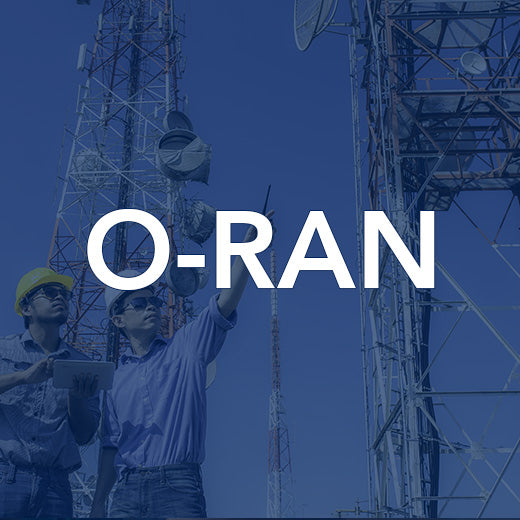
Open Radio Access Networks (Open RAN)
Open RAN is poised to revolutionize the Radio Access Networks (RAN) and the industry that supports it. The ORAN Alliance is paving the way for an open, intelligent, and fully interoperable architecture, aiming to foster a more competitive and innovative RAN supplier ecosystem. Telecom operators stand to benefit from Open RAN-compliant mobile networks, which enhance the efficiency and flexibility of RAN deployments and operations, crucial as networks transition through the phases of 5G deployment. Our Open RAN training course offers a comprehensive introduction to Open RAN, delving into its purpose, features, architecture, operation, and deployment options. Participants will also explore how Open RAN principles and its foundation in virtualization support the evolution to 5G, along with the impact of utilizing ORAN architecture on open and standardized interfaces. Ideal for individuals in technical roles within mobile network operators' Radio Access Network (RAN) environment, this course equips participants with the knowledge and skills needed to navigate the evolving landscape of Open RAN. A basic understanding of cellular radio networks from a radio network perspective is beneficial, as well as the ability to grasp technical subjects. Topics covered include Radio Access Networks, ORAN Players, 3GPP RAN Architecture for 5G, Open RAN Operations and Maintenance, and Whitebox Basestations. Join us for this two-day training course led by industry expert Les Granfield, a seasoned technical trainer with over 35 years of experience in various telecommunications technologies. Who would benefit Those in or entering technical roles in a mobile network operators Radio Access Network (RAN) environment. Prerequisites A basic understanding of cellular radio networks from a radio network perspective as well as the ability to comprehend technical subjects, would be useful. Topic Areas Include Radio Access Networks ORAN Players 3GPP RAN Architecture for 5G Open RAN, O-RAN Operations and Maintenance Whitebox Basestations Trainer: Les Granfield Les is a technical trainer with 35 years of experience. His expertise extends across a wide range of telecommunications technologies. He specializes in GSM, GSM-R, ERTMS/ETCS, UMTS and LTE radio access networks, radio planning, radio access network optimization and Push to Talk over Cellular (PoC).
POA: Private Course
-
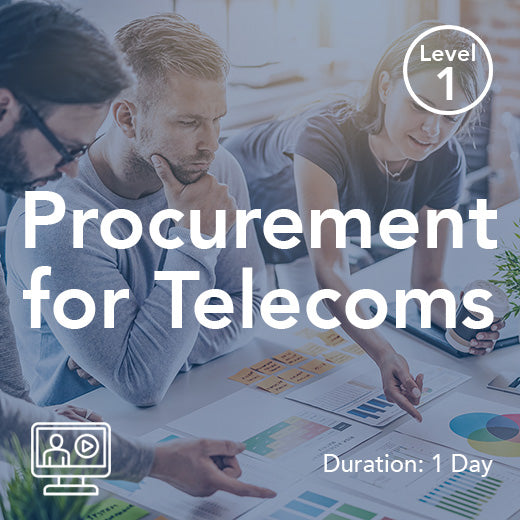
Procurement for Telecoms
Procurement plays a vital role in the telecommunications industry, ensuring the efficient and cost-effective acquisition of goods and services necessary for operations. With the rapid pace of technological advancements and evolving customer demands, telecom companies rely on procurement professionals to source and negotiate contracts for network infrastructure, equipment, software, and services. Effective procurement strategies can help telecom companies optimize their supply chains, control costs, and ensure efficient delivery of products and services. Furthermore, the procurement function involves managing vendor relationships, conducting market research, and staying updated on industry trends to drive innovation and maintain a competitive edge in this dynamic sector. The one-day Procurement for Telecoms course will enable you to build a better understanding of the key concepts and strategies in procurement and apply these concepts to your own organization. Prerequisites A basic understanding of business concepts and operations within the telecoms industry would be helpful, as would some familiarity with emerging Industry trends. Who would benefit? This training course would benefit telecoms executives or managers who work in, or have an interest in, the procurement process within telecoms and related organisations. Course Modules: Concepts of Procurement in Telecoms Supplier Strategy Identifying Potential Category Specific Procurement Levers Implementing a strategy CSR and Carbon Neutral for Procurement in Telecoms Course Director: Tim Williams Tim is a seasoned professional with extensive experience in procurement and supply chain management, his expertise spans strategic procurement advisory, procurement transformation, stakeholder management, and driving improvements in procurement functions. Tim is a Fellow of the Chartered Institute of Purchasing and Supply and has held significant leadership roles including: Senior Advisor to a Major Strategic Global Consultancy Chief Procurement Officer MTN Group (Location Dubai) Director of SCM Transformation and Services Procurement, Vodafone Procurement Company Head of Supply Chain Transformation Vodafone Group
POA: Private Course
-
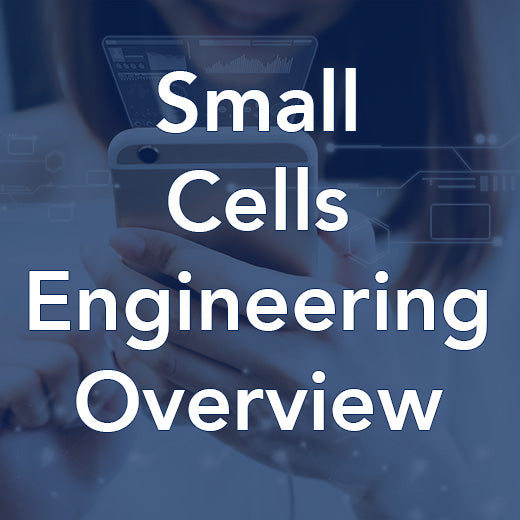
Small Cells Engineering Overview
This course provides a detailed overview of the technologies and techniques employed by Small Cell deployments. It describes the drivers for small cells in a heterogeneous network and identifies the various interfaces, protocols, security functions and network architectures. The features of Self Organising Networks (SON) are described and small cell backhaul techniques are explored. The course concludes with an overview of the future evolution of small cell technologies. This 2-day Small Cells Engineering Overview training course offered by Wray Castle provides a comprehensive understanding of the technologies and techniques used in Small Cell deployments. The course covers the drivers for small cells in a heterogeneous network, various interfaces, protocols, security functions, and network architectures. Participants will also learn about Self Organising Networks (SON), small cell backhaul techniques, and the future evolution of small cell technologies. Ideal for engineering and technical management professionals seeking a technical overview of protocols, architectures, standards, and configuration considerations related to small cell technologies, this course does not require prior cellular telecoms experience. Topics covered include Mobile Network Generations and Evolution, Small Cell Applications, SON Functions, Small Cell Backhaul Requirements, Security Techniques, and LTE-Advanced Small Cells, among others. Enroll in this live online training course consisting of 4 sessions from 0900-1230 to enhance your knowledge and skills in Small Cell technologies. Stay ahead in the rapidly evolving telecom industry with Wray Castle's expert-led training sessions. Who would benefit This course is suitable for engineering and technical management staff who require a technical overview of the protocols, architectures, standards and configuration considerations related to small cell technologies. Prerequisites Attendance on this course assumes basic cellular telecoms experience but this is not a necessity. Topic Areas Include Mobile Network Generations and Evolution Small Cells Definition The Small Cells Forum Small Cell Applications Associated Technologies and Developments Small Cell Network Architectures Heterogeneous Networks 3G HNB, 4G HeNB Architecture Closed Subscriber Groups Small Cell network architecture, components and interfaces Small cells in the enterprise SON (Self Organizing Networks) Small Cell SON Functions Automatic small cell initialization and configuration Small Cell Backhaul Requirements Wireline and Wireless Backhaul Solutions Broadband-based Backhaul Carrier Ethernet Security, Synchronization, QoS and Reliability Techniques Technology Roadmap for Small Cells LTE-Advanced Small Cells Interworking with Wi-Fi Future developments
POA: Private Course
-
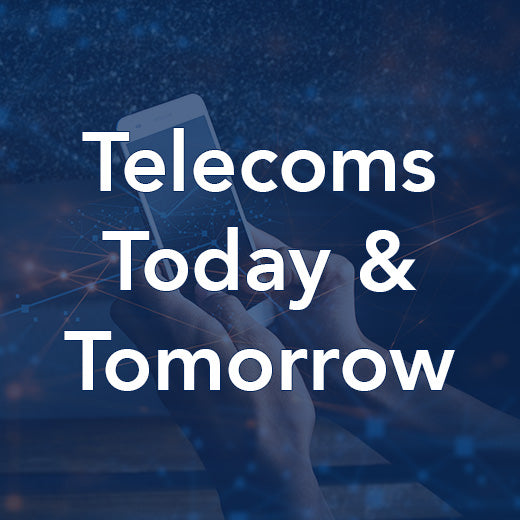
Telecoms - Today and Tomorrow
This intensive one-day workshop provides delegates with a clear understanding of the technologies available for use within communications networks. It considers how technologies have evolved and then considers fixed-line and mobile voice and data networks. The full range of broadband technologies is introduced both for fixed and mobile access. Join our Telecoms Today and Tomorrow workshop to gain a comprehensive understanding of the technologies driving communication networks. This one-day course covers the evolution of technologies, fixed-line and mobile voice and data networks, and a range of broadband technologies for both fixed and mobile access. Whether you're a senior executive, manager, regulator, market analyst, marketer, or new industry recruit, this workshop is designed to benefit anyone in the communications industry seeking insight into converged communications markets. No technical background is required to participate in this workshop, making it accessible to a wide range of professionals. Topics covered include the operation of PSTN, circuit switching vs. packet switching, Intelligent Network principles, Value Added Services, mobile networks, IP data networks, Quality of Service in data networks, Next Generation Networks, Voice over IP challenges, core network evolution, and more. By the end of the workshop, you'll have a solid understanding of transmission technologies, optical fibre techniques, satellite telecommunication networks, GPS, broadcast radio and TV networks, and other key concepts shaping the future of telecommunications. Don't miss this opportunity to enhance your knowledge and stay ahead in the rapidly evolving telecom industry. Enroll in our Telecoms Today and Tomorrow workshop today and gain valuable insights into the technologies shaping the future of communication networks. Who would benefit Those involved in the communications industry who require an understanding of the wide range of technologies used within a converged communications market such as: senior executives; managers; regulators; market analysts; marketeers and new recruits to the industry. Prerequisites This workshop is designed for those with no technical background. Topic Areas Include Basic operation of the Public Switched Telephone Network (PSTN) Comparison of circuit switching and packet switching techniques Principles of an Intelligent Network (IN) Opportunities provided by Value Added Services (VAS) Basic operation of mobile networks and features of an IP data network Quality of Service (QoS) in data networks Fixed broadband access technologies and mobile networks Principles of Next Generation Networks (NGN) Challenges of operating Voice over IP (VoIP) Evolution of fixed and mobile core networks The IP Multimedia Subsystem (IMS) Transmission technologies including PDH and SDH Developments in optical fibre techniques Operation of satellite telecommunication networks The Global Positioning System (GPS) Principles of broadcast radio and TV networks
£980.00
-
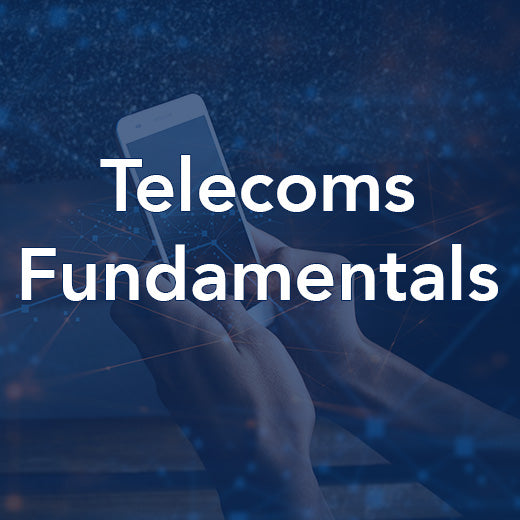
Telecoms Fundamentals
Course Code: WR1701 Course Summary This course has been designed for those who do not have a technical background and are new to the telecommunications industry or those who are currently working in the sector. The historical background to telecommunications is described and the technologies, abbreviations and techniques that are employed are explained. During the course, emphasis is placed on learning by group work, discussion and exercises that enhance the understanding of networks and their operation. Use of laptops, tablets and smartphones with Internet access are employed to explore emerging technologies in various areas. Videos and images of equipment and networks are used to explore the many applications of telecommunication in the modern world. Topic Areas Include Defining Telecoms and the Nature of Information A Historical Background to the Telecom Network Digital Fixed Telecom Networks Data Networks Mobile Networks and Wi-Fi Broadband and Emerging Networks
POA: Private Course
-
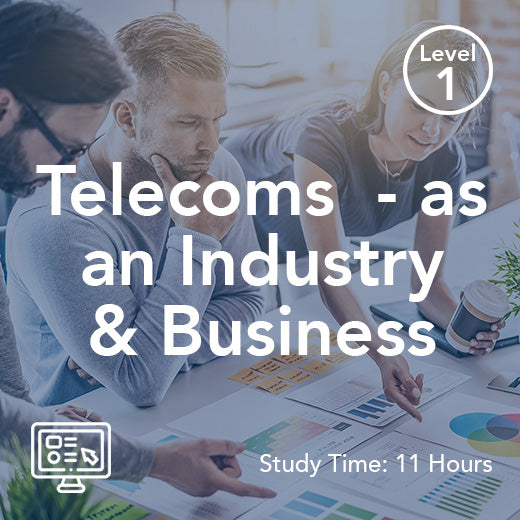
Telecoms – as an Industry and Business (On-Demand)
The Telecoms Industry is based on a range of technologies that are extremely diverse, wide ranging, and highly complex. With this foundation, the industry is able to support a wide variety of service propositions in a significant number of identifiable sectors, and as a result, a vast array of business models. The complex business ecosystems are comprised of many thousands of companies and the relationships that exist between them. This includes Communications Service Providers (CSP), Network Equipment and Handset Vendors, Service / Support Companies, Standardisation Bodies, Regulators, and Content / Media Companies. The ecosystems are dynamic in nature and evolving rapidly in terms of focus. The sheer scale of it all makes it difficult to fully understand and analyse, but in this course, we start that process. We explore the overall make-up of the industry and the business dynamics; the types of organisations involved and their roles and relationships; the service propositions; and main customer segments. We also briefly consider company strategy and business models. An evaluation of the key technologies that support the industry is made, including projections, time-lines and overall market trajectories. Topic Areas Include: Telecoms Industry and Business Dynamics The Technology Explained and Evaluated Telecoms Industry and Market Update
£500.00
-
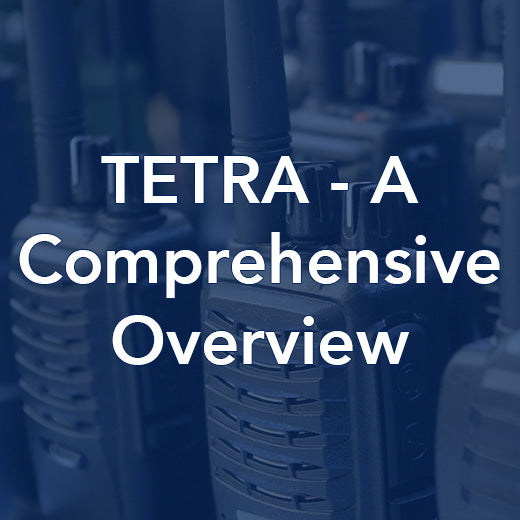
TETRA A Comprehensive Overview
This comprehensive TETRA course covers all aspects of a TETRA system, including the TETRA 1 and TETRA 2 standards. Participants will gain an understanding of trunking principles, service aspects, network planning, architecture, and technical details about the TETRA radio interface. This course is ideal for those working or involved in PMR or PAMR who need to understand TETRA technology, specifications, and capabilities. Participants will explore topics such as TETRA standards, trunked radio principles, traffic analysis, TETRA services and interfaces, cellular principles, network planning, TETRA security, frequency allocations, channels, network architecture, user terminals, radio interface, mobility management, and Direct Mode Operation (DMO). Familiarity with the architecture and general operation of typical VHF or UHF mobile networks is advantageous, and some understanding of radio techniques is useful for this course. Who would benefit Those working or involved in PMR or PAMR who need to understand TETRA technology, specification and capabilities. Prerequisites Familiarity with the architecture and general operation of typical VHF or UHF mobile networks is advantageous, and some understanding of radio techniques is useful. Topic Areas Include An overview of the TETRA standards TETRA 2 Trunked radio principles Traffic analysis TETRA services and interfaces Cellular principles Network planning TETRA security TETRA frequency allocations TETRA channels Network architecture TETRA user terminals The TETRA radio interface TETRA mobility management Direct Mode Operation (DMO)
POA: Private Course
-
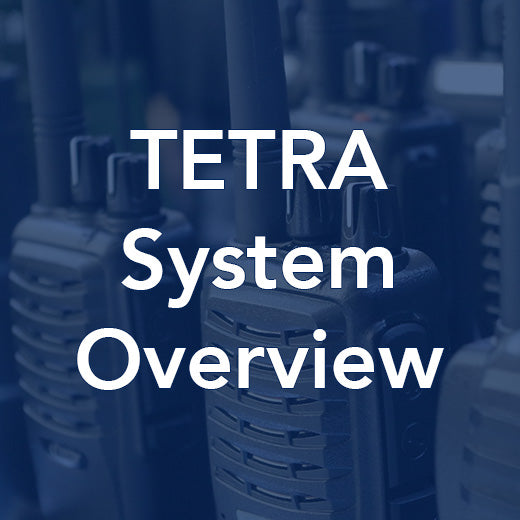
TETRA System Overview
The TETRA System Overview course provides a comprehensive understanding of TETRA technology, covering both TETRA 1 and TETRA 2 standards. Participants will learn about trunking principles, network planning, architecture, and technical details of the TETRA radio interface. Ideal for those working in PMR or PAMR industries, this course is designed for individuals who need to grasp the specifications and capabilities of TETRA technology. Familiarity with VHF or UHF mobile networks and a basic understanding of radio techniques are advantageous prerequisites for this training. The course covers a wide range of topics, including TETRA standards overview, trunked radio principles, traffic analysis, network planning, security, frequency allocations, and more. By the end of the course, participants will have a solid foundation in TETRA technology and its applications in professional mobile radio communications. Who would benefit Those working or involved in PMR or PAMR who need to understand TETRA technology, specification and capabilities. Prerequisites Familiarity with the architecture and general operation of typical VHF or UHF mobile networks is advantageous, and some understanding of radio techniques is useful. Topic Areas Include An overview of the TETRA standards TETRA 2 Trunked radio principles Traffic analysis TETRA services and interfaces Cellular principles Network planning TETRA security TETRA frequency allocations TETRA channels Network architecture TETRA user terminals The TETRA radio interface TETRA mobility management Direct Mode Operation (DMO)
POA: Private Course





























































